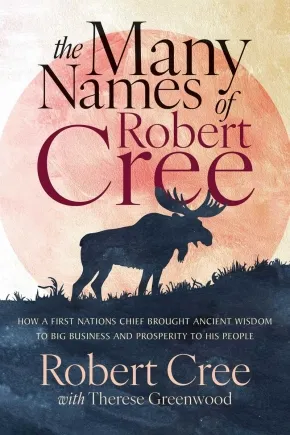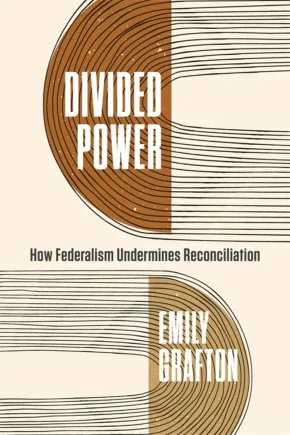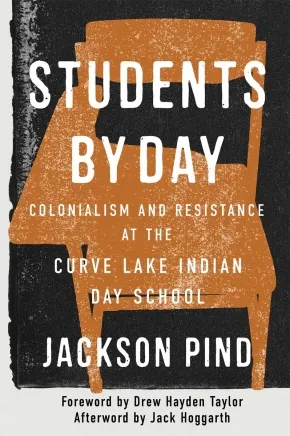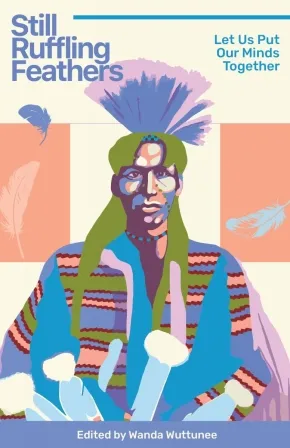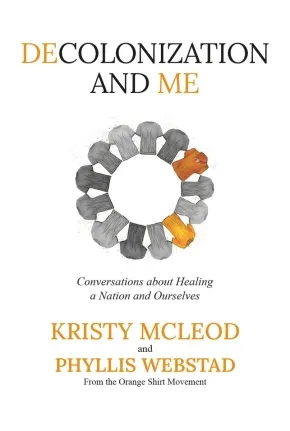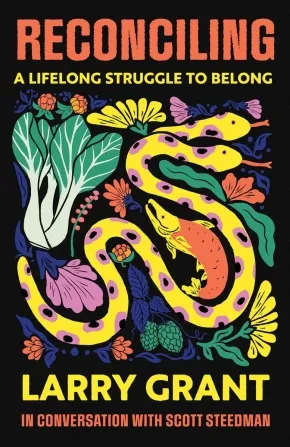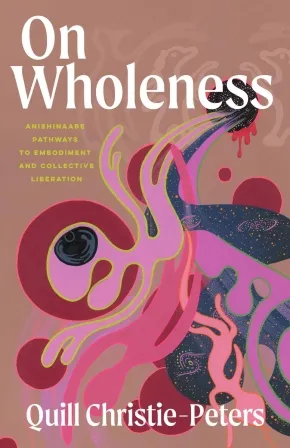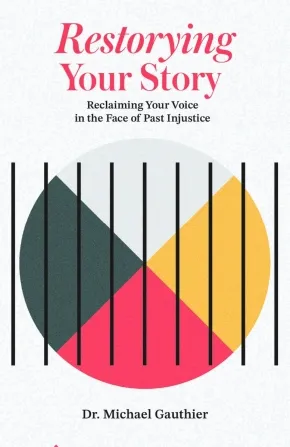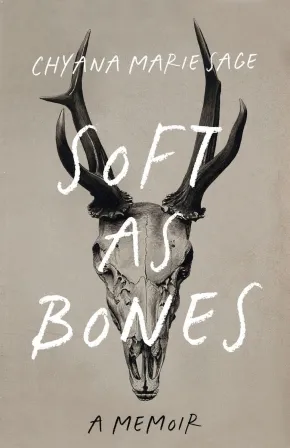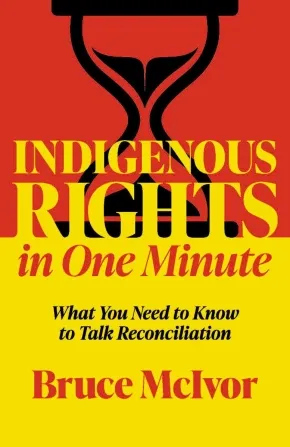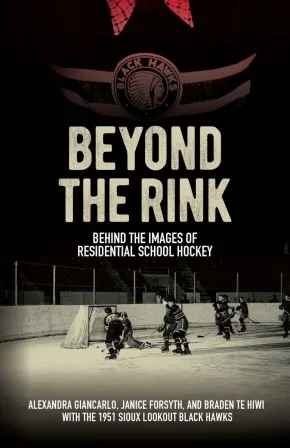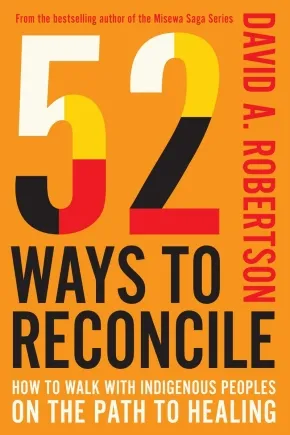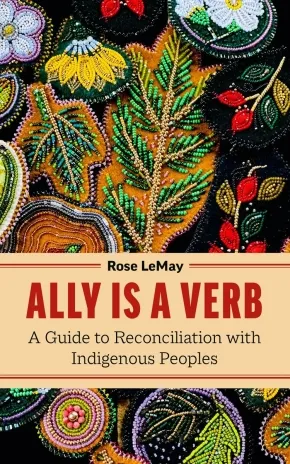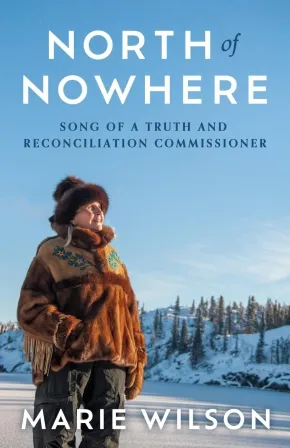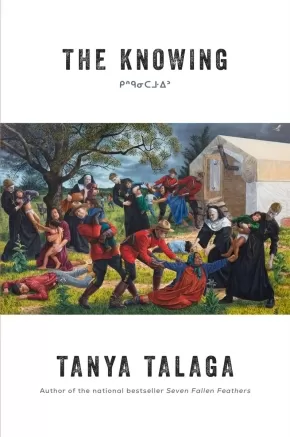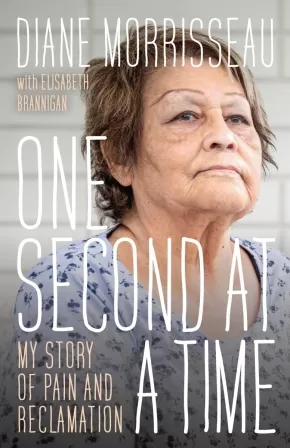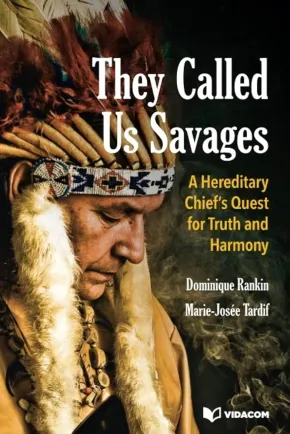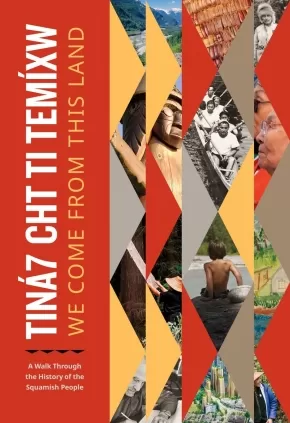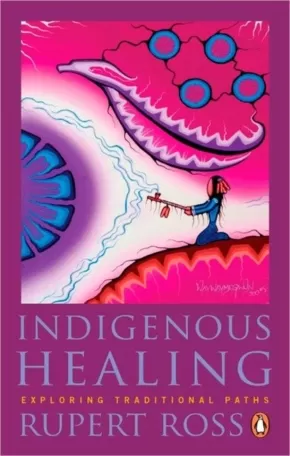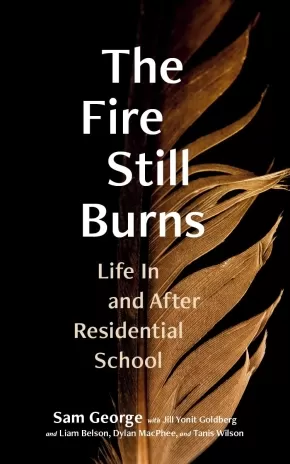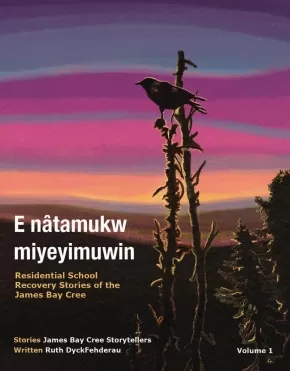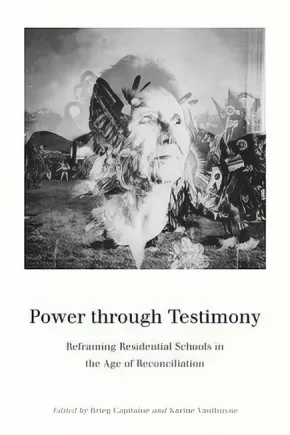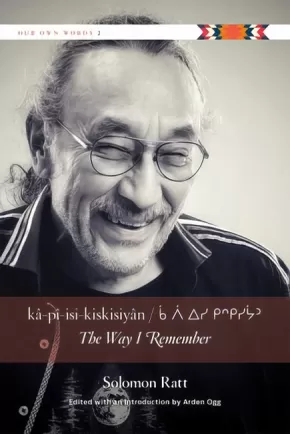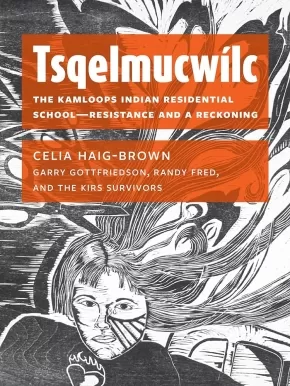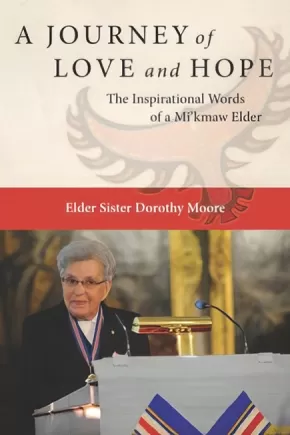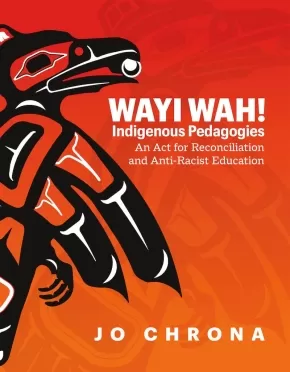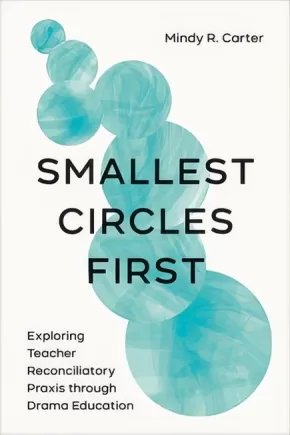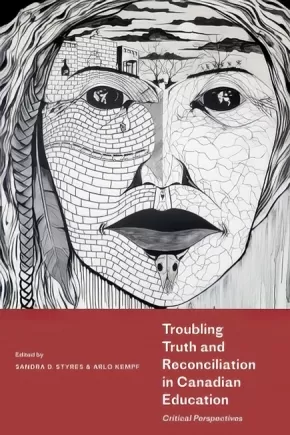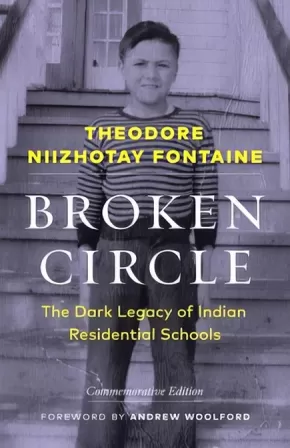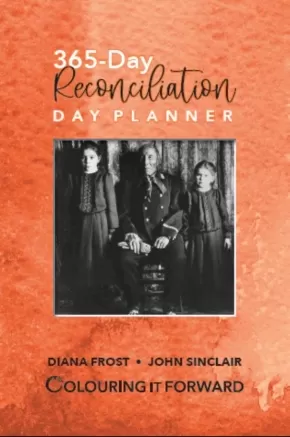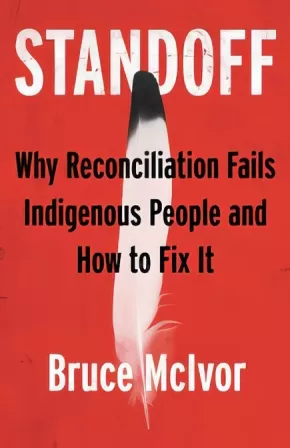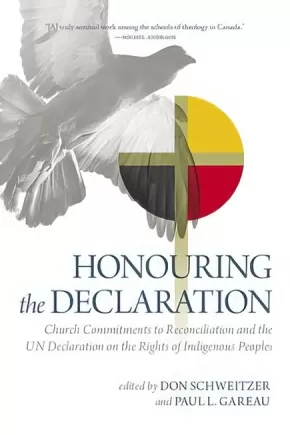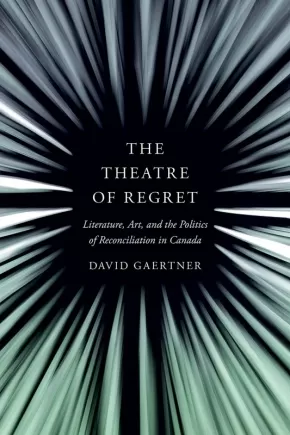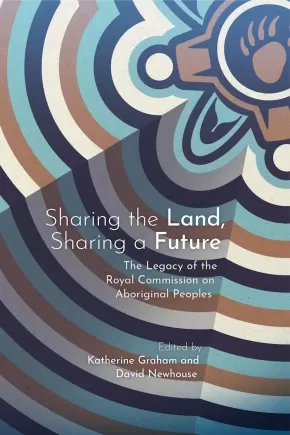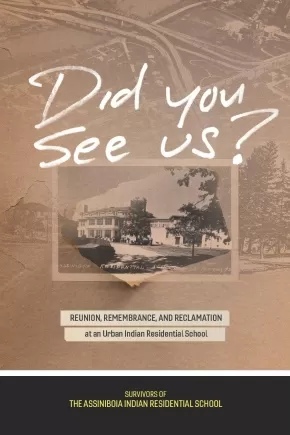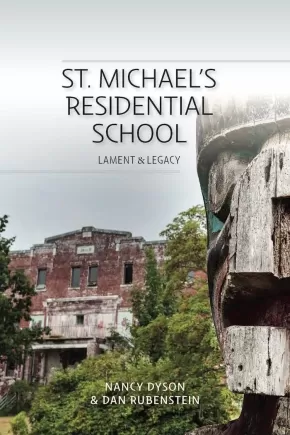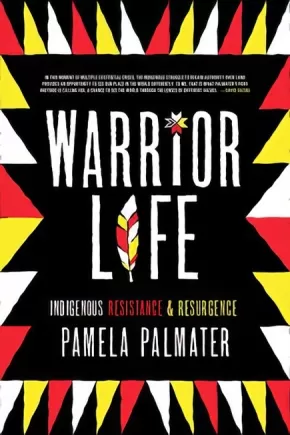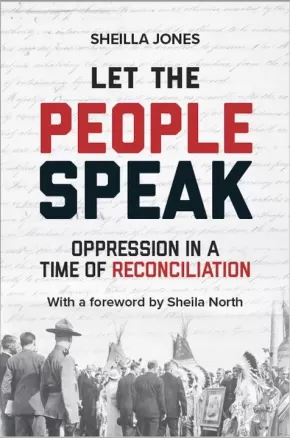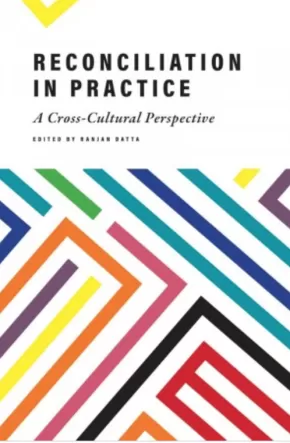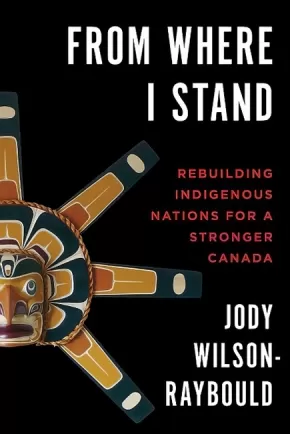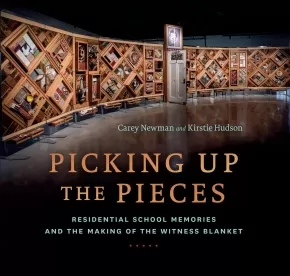
Legacy and Reconciliation
1
-
15
of
72 Results;
Sort By
Go To
of 5
The Many Names of Robert Cree: How a First Nations Chief Brought Ancient Wisdom to Big Business and Prosperity to His People
$26.95
Format:
Paperback
Reading Level: N/A
ISBN / Barcode: 9781770418301
Synopsis:
Synopsis:
A vital account of the life and many names of Robert Cree, and his plan for a peaceful, sincere, and just path to reconciliation in an angry and chaotic world.
His mother called him “Bobby Mountain.” Elders called him “Great Man.” His people called him “Chief.” Oil men called him “Mr. Cree.” But the government called him “Number 53.” Robert Cree was all of these while facing his people’s oppressors and freeing the ghosts of tortured spirits.
The Many Names of Robert Cree is his first-person account of survival in a brutally racist residential school system designed to erase traditional Indigenous culture, language, and knowledge. It is also the story of an epic life of struggle and healing, as Cree takes the wisdom of his ancestors and a message of reconciliation to the halls of government and to industry boardrooms.
In the storytelling tradition of his people, Cree recounts his early years in the bush, his captivity at a residential school, his struggles with addiction, his political awakening as one of Canada’s youngest First Nation Chiefs, and the rising Indigenous activism of the late 20th and early 21st centuries. He also recounts the oil industry’s arrival on his poverty-stricken reserve and the ensuing struggle to balance economic opportunity with environmental challenges.
Throughout, Cree’s leadership is rooted in his unshakable commitment to the sacred traditional teachings of his people. His beliefs give him the strength to focus on hope, dignity, and building a better future for his community. Now a respected Elder and spiritual leader, Cree champions forgiveness as a powerful force that can bring healing and transformation for all.
Additional Information
264 pages | 6" x 9" | Paperback
Divided Power: How Federalism Undermines Reconciliation
$32.00
Format:
Paperback
Reading Level: N/A
ISBN / Barcode: 9781773637723
Synopsis:
Synopsis:
Reconciliation, as set out by the Truth and Reconciliation Commission, is a process of understanding the Canadian state's genocide against Indigenous Peoples and creating a new relationship between Indigenous Peoples and settlers based on mutual respect and dignity. Given the racism and paternalism embedded in the Canadian state and related institutions, building such a relationship is a monumental task, but in addition, there is a major structural roadblock in the way: federalism, the political system that organizes Canadian governance.
Divided Power argues that Canada’s system of federalism, rooted in settler colonialism, has dispossessed Indigenous Peoples for settler benefit. Far from being a neutral, balanced way to distribute responsibilities and powers, the division between the state and provinces and territories obstructs Indigenous Peoples’ agency and governance. Under such coercive political exclusion, how can truth and reconciliation be fully achieved? Emily Grafton meticulously traces the ways that federalism limits the potential for reconciliation and proposes alternative power-sharing models.
Guiding readers through the terrain of debate, Grafton deftly and accessibly merges a political analysis of federalism with a clear assessment of settler colonialism to argue that reconciliation will be incomplete for as long as the current division of powers persists. Divided Power points to a promising approach to holding the Canadian state responsible for integrating the principles of truth and reconciliation into its very foundation.
Reviews
“Emily Grafton explores Canadian federalism – not the usual division of powers between the federal and provincial governments, but between the colonized and the colonizer. Federalism, Grafton argues, was informed by Indigenous political frameworks but has been torqued by colonial assumptions about Indigenous inferiority so as to require colonial dominance and Indigenous subordination. This book is a useful antidote to the complacent endorsement of the settler state status quo, so prevalent in scholarship and in politics.” - Joyce Green, Ktunaxa Nation, Professor Emerita, University of Regina; Elder-Auntie, CPSA Reconciliation Committee
“Grafton exposes the evolution and coloniality of Canadian federalism in its unjust and mundane efforts to diminish Indigenous sovereignties. Divided Power is a tour de force of alternatives, and you’ll never think of federalism the same way after reading it!” - Ajay Parasram, author of Pluriversal Sovereignty and the State
Additional Information
192 pages | 6.00" x 9.00" | Paperback
Students by Day: Colonialism and Resistance at the Curve Lake Indian Day School
$29.95
Format:
Hardcover
Text Content Territories:
Indigenous Canadian; First Nations; Anishinaabeg; Ojibway; Mississaugas; Curve Lake First Nation;
Reading Level: N/A
ISBN / Barcode: 9780228026044
Synopsis:
Synopsis:
Offering readers a unique history of an Indian Day School and a profile of Anishinaabe resilience.
The atrocities of the residential school system in Canada are amply documented. Less well-known is the history of day schools, which some two hundred thousand Indigenous youth attended.
The Curve Lake Indian Day School operated for over ninety years, from 1899 to 1978. Implementing Indigenous community research practices, Jackson Pind, alongside the Chief and Council of Curve Lake First Nation, conducted a search of the federal archive on operations at the school. Students by Day presents the findings, revealing that the government failed in its fiduciary duty to protect students. Harmful and discriminatory policies forced children to abandon their language and culture and left them subject to many types of abuse. To supplement this documentation, Pind also interviewed survivors of the school, who shared their often difficult testimony. He situates Curve Lake’s development and operations within the wider context of Canadian assimilation policies, noting the lasting impacts on Anishinaabe identity and culture.
Not only recovering the archive, written and oral, but building on files repatriated to the community, Students by Day is a story of Indigenous resilience, activism, and hope in the face of educational injustice.
Reviews
“An incredible achievement. Students by Day is innovative and collaborative, pushing Indigenous historical research forward in ways that will offer real, tangible improvements to communities and individuals.” - Lianne C. Leddy, author of Serpent River Resurgence: Confronting Uranium Mining at Elliot Lake
“Students by Day is an intricate uncovering of day schools’ history, navigating archives and life stories. It sets a gold standard for community-centred research, reminding us of the centrality of love to culture, people, and politics.” - Niigaan Sinclair, author of Wînipêk: Visions of Canada from an Indigenous Centre
“With care, clarity, and accountability, Jackson Pind’s book listens to Curve Lake First Nation and honours survivors’ experiences. Students by Day is not only powerful history; it’s a model for community-based research that serves Indigenous resurgence.” - Crystal Gail Fraser, author of By Strength, We Are Still Here: Indigenous Peoples and Indian Residential Schooling in Inuvik, Northwest Territories
Educator Information
Table of Contents
Figures vii
Foreword: Day Schools xi
Drew Hayden Taylor
Acknowledgments xv
1 Introduction to Place: Growing Up in Michi Saagiig Anishinaabeg Territory 3
2 Researching Indian Day Schools in Canada 15
3 The New England Company and the Creation of the Indian Day School 30
4 Mismanagement and Mistrust: The Methodist Missionary School in Curve Lake 45
5 A Legacy of Neglect: The United Church of Canada’s Indian Day School 86
6 Beyond the Classroom: Educational Philosophies and Opportunities 122
7 Experiencing Indian Day School: Education and Integration 150
8 A Class in Resistance: Curve Lake First Nation’s Fight for Education 173
Afterword 197
Jack Hoggarth
Appendix: Letter of Support from Curve Lake First Nation 201
Notes 203
Index 255
Additional Information
256 pages | 6.00" x 9.00" | 9 photos, 5 drawings | Hardcover
Still Ruffling Feathers: Let Us Put Our Minds Together
$24.95
Format:
Paperback
Text Content Territories:
Indigenous Canadian; First Nations; Cree (Nehiyawak); Plains Cree; Red Pheasant Cree Nation;
Reading Level: N/A
ISBN / Barcode: 9781772841183
Synopsis:
Synopsis:
Revisiting the political activism of WIC Wuttunee
William (Bill) Wuttunee was a trailblazing lawyer, a courageous native rights activist; and one of the architects of the process for the Truth and Reconciliation Commission. His 1971 book, Ruffled Feathers: Indians in Canadian Society, decried conditions on reserves and pressed for integration-on Indigenous peoples' own terms-supporting many of the aims of the Trudeau government's 1969 "White Paper." Though controversial at the time, Wuttunee's arguments were rooted in a foundational belief in the strengths of his people and a steadfast rejection of victimhood. In the fifty years that have followed its publication, Ruffled Feathers has been largely forgotten, though ideas that Wuttunee put forth-ending the Indian Act and the reserve system-continue to find space within contemporary Canadian political discourse.
In this volume, editor Wanda Wuttunee gathers a diverse cohort of scholars to engage with her father's ideas and offer their own perspectives on the opportunities and challenges facing Indigenous peoples in Canada, then and now. Favouring discourse over conclusions, Still Ruffling Feathers leads the reader to a nuanced understanding of the ongoing conversations and unresolved issues stemming from the Indian Act and invites us to envision miyo-pimâtisiwin, "the good life."
Reviews"
"Still Ruffling Feathers explores an important area of modern history on Indigenous leadership. The thoughts and ideas expressed by William Wuttunee still have resonance today." - Dr. Brian Caillou, University of Calgary
Educator Information
Table of Contents
Brotherhood by William I.C. Wuttunee
Acknowledgements
Contributors
Introduction by Wakchan (Wanda Wuttunee), Red Pheasant Cree Nation, Saskatchewan
Chapter 1. Reflections on a Legacy--An Eagle Eye Perspective by Wakchan (Wanda Wuttunee), Red Pheasant Cree Nation, Saskatchewan
Chapter 2. Still Ruffling Feathers Too--More than 50 Years Later by Makookins (Xakiji (Chief) Lee Crowchild), Tsuut'ina Nation, Alberta
Chapter 3. William Wuttunee--Ruffling Feathers in "Indian" Time and Space by Thohahoken (Michael Doxtater), Mohawk Turtle Clan Family of Satekariwate, Ontario
Chapter 4. Learning to Straighten Our Ruffled Feathers: An Education by Askîy Pihêsiw (Robert Falcon Ouelette), Red Pheasant Cree Nation, Saskatchewan
Chapter 5. Ruffled Feathers: A Critical Assessment by Bush Doctor (Peter Kulchyski), Bissett, Manitoba
Chapter 6. Final Thoughts--Debating Our Future, Coming to One Mind by David Newhouse, Onandaga, Six Nations of the Grand River, Ontario.
Appendix A: Excerpts from Ruffled Feathers (1971) by William I.C. Wuttunee
Appendix B. Selected Poetry of William I. C. Wuttunee
Appendix C. Discussion Questions Bibliography
Additional Information
204 pages | 5.50" x 8.50" | Paperback
Gino: The Fighting Spirit of Gino Odjick
$36.00
Format:
Hardcover
Text Content Territories:
Indigenous Canadian; First Nations; Anishinaabeg; Algonquin; Kitigan Zibi Anishinabeg;
Reading Level: N/A
ISBN / Barcode: 9781778402708
Synopsis:
Synopsis:
From veteran hockey reporter Patrick Johnston and Gino’s longtime friend Peter Leech comes the authorized biography of Gino Odjick.
In the 1980s and ’90s, National Hockey League games were very different from the nimble, skill-focused displays we see today. One of the greatest differences—and one of the sport’s more popular facets at the time—was the widespread presence of “enforcers”: hulking, battle-scarred players whose main task was to police the sport by chasing down and brawling with opponents who had broken unwritten codes determining which aspects of violence counted as dishonorable or unjustified.
When hard-hitting Vancouver Canucks player Gino Odjick emerged in the early 1990s, he quickly became one of the game’s most feared enforcers and revered teammates, a sign of a new era for the team, racking up 296 penalty minutes in the 45 games he played in his rookie season. Hailing from Kitigan Zibi, an Algonquin community near Maniwaki, Quebec, Gino was one of the few Indigenous players in the NHL at the time. But it was Gino’s ferocious play contrasted by his genuinely affable and openhearted personality off the ice that won him a special place in the hearts of Canucks supporters.
Yet legends often obscure the human stories behind them. Patrick Johnston and Peter Leech look beyond Gino’s legendary persona, drawing on insights from family members, friends, and teammates to recount Gino’s early years in a loving household that was always ready to welcome foster children. Gino’s father, Joe, had suffered the lonely traumas of the residential school system, and the experience had instilled a commitment in the family to those who were less fortunate.
The book also details Gino’s eventual struggles with alcohol abuse, and how he responded by taking on the role of empathetic mentor to young Indigenous people, travelling from community to community to hear their stories and offer hope. He never wavered in this role, even as he confronted serious illnesses, including chronic traumatic encephalopathy (CTE) and the rare blood disorder that he survived for years longer than expected, but that eventually led to his death at age fifty-two.
Gino is a moving tribute to a beloved hockey legend.
Reviews
"Gino was the greatest teammate; he had such a huge heart and knew his role better than anyone in the league. Gino loved being a Vancouver Canuck and gave back to the community in so many ways. He will be greatly missed by his family, friends, and fans. This book will give people insight into his remarkable life."—Geoff Courtnall
“Gino provides a compelling account of the life of a beloved Vancouver Canuck. From his humble beginnings in Quebec to NHL stardom and beyond, Odjick was dedicated to the well-being of teammates and the Indigenous community. This is an excellent tribute to an exceptional man.”—Randi Druzin, author of Between the Pipes and Behind the Mask
Additional Information
288 pages | 6.00" x 9.00" | b&w insert | Hardcover
Decolonization and Me: Conversations about Healing a Nation and Ourselves
$30.99
Text Content Territories:
Indigenous Canadian; First Nations; Salish; Interior Salish; Secwepemc (Shuswap); Stswecem'c Xgat'tem; Métis;
Reading Level: N/A
ISBN / Barcode: 9781778540684
Synopsis:
Synopsis:
This book invites readers to step into a space of reflection on your personal relationship with truth, reconciliation, and Orange Shirt Day.
Written in response to the increase of residential school denialism, Phyllis Webstad and Kristy McLeod have collaborated to create a book that encourages readers to face their own biases. This book challenges readers through a series of sensitive conversations that explore decolonization, Indigenization, healing, and every person’s individual responsibility to truth and reconciliation. Centered around the Orange Shirt Day movement, and a National Day for Truth and Reconciliation, these conversations encourage readers to unpack and reckon with denialism, biases, privilege, and the journey forward, on both a personal and national level.
Within each chapter, Phyllis Webstad draws on her decade of experience (sharing her Orange Shirt Story on a global level and advocating for the rights of Indigenous Peoples) to offer insights on these topics and stories from her personal journey, which co-author and Métis scholar, Kristy McLeod, helps readers to further navigate. Each section includes real denialist comments taken from social media and Kristy's analysis and response to them. Through empathy-driven truth-telling, this book offers an opportunity to witness, reflect, heal, and be intentional about the seeds we hope to plant for the future, together.
Additional Information
350 pages | 5.70" x 8.25" | Hardcover
Reconciling: A Lifelong Struggle to Belong
$26.95
Format:
Paperback
Text Content Territories:
Indigenous Canadian; First Nations; Salish; Coast Salish; Musqueam;
Reading Level: N/A
ISBN / Barcode: 9781770417984
Synopsis:
Synopsis:
A celebration and in-depth exploration of Canada’s West Coast through an Indigenous and immigrant lens, Reconciling weaves together personal tales and tough histories for guiding steps toward true understanding.
A personal and historical story of identity, place, and belonging from a Musqueam-Chinese Elder caught between cultures.
It’s taken most of Larry Grant’s long life for his extraordinary heritage to be appreciated. He was born in a hop field outside Vancouver in 1936, the son of a Musqueam cultural leader and an immigrant from a village in Guangdong, China. In 1940, when the Indian agent discovered that their mother had married a non-status man, Larry and his two siblings were stripped of their status, suddenly labeled “bastard children.” With one stroke of the pen, they were no longer recognized as Indigenous.
In Reconciling, Larry tells the story of his life, including his thoughts on reconciliation and the path forward for First Nations and Canada. His life echoes the barely known story of Vancouver — and most cities in the Americas, from Cusco to Mexico City, from New York to Toronto. It combines Indigenous traditions with key events of the last two centuries, including Chinese immigration and the Head Tax, the ravages of residential schools, and now Indigenous revival and the accompanying change in worldview. Each chapter takes the form of a series of conversations between Larry and writer Scott Steedman and is built around one pivotal geographical place and its themes, including the Musqueam reserve, Chinatown, the site of the Mission Residential School, the Vancouver docks, and the University of British Columbia.
When Larry talks about reconciliation, he uses the verb reconciling, an ongoing, unfinished process we’re all going through, Indigenous and settler, immigrant and Canadian-born. “I have been reconciling my whole life, with my inner self,” he explains. “To not belong was forced upon me by the colonial society that surrounded me. But reconciling with myself is part of all that.”
Reviews
“Musqueam Elder Larry Grant’s intimate eyewitness accounts of huge changes in the region’s landscape and its evolving relationship with his people are a must-read for people who want to join Canada’s journey towards reconciliation.” — Paul Yee, author of Saltwater City
“Conversing with the ideal listener, the inquisitive, sensitive journalist Scott Steedman, Larry Grant speaks unflinchingly of his dual heritages and how, for most of his life, he had to suppress one or another or both. Steedman presents Grant’s spoken prose with pristine clarity, and so governmental crimes and real-estate wrongs are laid bare, and unbearable is our outrage, but necessary is our courage to rectify and reconcile.” — George Elliott Clarke, author of Where Beauty Survived: An Africadian Memoir
“Larry Grant’s conversational memoir is a poignant and honest recollection of identity politics as well as a meditation on bearing witness and surviving ecological and cultural displacement. His wise words invite you to reflect on how all of us can better reconcile with the past, present, and future and how we can never escape the fact that everything in this world is connected.” — Donna Seto, author of Chinatown Vancouver: An Illustrated History
Additional Information
232 pages | 5.50" x 8.50" | 16 black and white halftones; bibliography; table of contents | Paperback
On Wholeness: Anishinaabe Pathways to Embodiment and Collective Liberation
$26.99
Format:
Paperback
Text Content Territories:
Indigenous Canadian; First Nations; Anishinaabeg; Ojibway; Saulteaux; Lac des Mille Lacs (Nizaatikoong);
Reading Level: N/A
ISBN / Barcode: 9781487013257
Synopsis:
Synopsis:
A brilliant exploration of the body as a site of settler colonial impact, centring embodied wholeness as a pathway to our collective liberation.
This fierce and enlightening book reimagines the way we understand settler colonialism-through the body itself. Anishinaabeg visual artist Quill Christie-Peters takes us on a journey that begins before birth, in a realm where ancestors and spirits swirl like smoke in the great beyond. But once we enter the world, our bodies are shaped and scarred by colonial forces.
In poetic and raw storytelling, Quill shares her own experiences of gendered violence and her father's survival of residential school, revealing how colonialism disconnects us from ourselves. Yet, through an Anishinaabeg lens, the body is more than just flesh-it extends to ancestors, homelands, spirit relations, and animal kin.
Through reflections on childbirth, parenting, creative practice, and expansive responsibility as pathways to wholeness, Quill explores how reconnecting with the body can be an act of resistance and healing. She shows that wholeness-despite pain and displacement-is not just possible but essential for liberation, not only for Indigenous people but for all of us.
Additional Information
288 pages | 5.50" x 8.50" | Paperback
Restorying Your Story
$20.99
Format:
Paperback
Reading Level: N/A
ISBN / Barcode: 9781778540745
Synopsis:
Synopsis:
The stories we tell ourselves about our lives matter. How we make sense of the past affects how we make sense of the present— it can mean the difference between continuing patterns of harm and being the one to break the cycle. Scholar and author Michael Gauthier knows this struggle intimately. As a young Indigenous man grappling with the lasting effects of colonialism and intergenerational trauma, Michael turned to addiction to ease the pain and found himself in the prison system. In the intervening years, Michael has worked to understand how Indigenous people can find empowerment through the act of restorying their own lives. Gauthier draws on his PhD research in which he carried out Restorying circles using the Medicine Wheel as a guide to help formerly incarcerated Indigenous men map a new future by looking to their past. Now in Restorying Your Story, Gauthier invites readers to explore the universal application of restorying, and how it can be a powerful tool for all of us to build a good life.
Additional Information
150 pages | 8.50" x 5.50" | Paperback
Soft as Bones: A Memoir
$26.99
Format:
Paperback
Text Content Territories:
Indigenous Canadian; Métis; First Nations; Cree (Nehiyawak);
Reading Level: N/A
ISBN / Barcode: 9781487013028
Synopsis:
Synopsis:
A poetic memoir as intricately woven as a dreamcatcher about overcoming the pain of generational trauma with the power of traditional healing.
In her deeply affecting memoir, Soft as Bones, Chyana Marie Sage shares the pain of growing up with her father: a crack dealer who went to prison for molesting her older sister. She details the shame and guilt she carried for years after her family's trauma as she went from one dysfunctional relationship to another, from one illegal drug to another. In revisiting her family's history and weaving in the perspectives of her mother and sisters, Chyana examines the legacy of generational abuse, which began with her father's father, who was forcibly removed from his family by the residential schools and Sixties Scoops programs.Yet hers is also a story of hope, as it was the traditions of her people that saved her life. In candid, incisive, and delicate prose, Chyana braids personal narrative with Cree stories and ceremonies, all as a means of healing one small piece of the mosaic that makes up the dark past of colonialism shared by Indigenous people throughout Turtle Island.
Reviews
"Chyana Marie Sage's writing is a gift that gleams with all of its teeth and skin and soft parts of the earth ... A stunning new voice that pushes the boundaries of form, whose stories swirl across time like sweetgrass braids, like tendrils of smoke." — Kinsale Drake, author of The Sky Was Once a Dark Blanket
"A searing, poetic memoir filled with resilience and strength ... for anyone on a journey of reconciling the pain of the past with the hopes for the next generations." — Dallas Goldtooth, writer, actor, and community organizer
"Chyana Marie Sage writes with an unflinching emotional clarity, lyrical prose, and a wisdom well beyond her years." — Tanya Talaga, author of The Knowing
"Soft as Bones moves like a river across vast territories of recovery and reckoning: it moves powerfully and runs deep, with prose that carries many worlds on its shoulders ... Chyana Marie Sage is a truth-teller, and she has given us an incredible gift." — Leslie Jamison, author of Splinters
Additional Information
296 pages | 5.50" x 8.50" | Paperback
Indigenous Rights in One Minute: What You Need to Know to Talk Reconciliation
$22.95
Format:
Paperback
Text Content Territories:
Indigenous Canadian;
Reading Level: N/A
ISBN / Barcode: 9780889714885
Synopsis:
Synopsis:
Internationally renowned as an expert in Aboriginal law and an advocate for Indigenous rights, Bruce McIvor delivers concise, essential information for Canadians committed to truth and reconciliation.
A shortage of trustworthy information continues to frustrate Canadians with best intentions to fulfill Canada’s commitment to reconciliation with Indigenous Peoples. To meet this demand, lawyer and historian Bruce McIvor provides concise, plain answers to 100 essential questions being asked by Canadians across the country.
During his nearly three decades advocating for Indigenous rights and teaching Aboriginal law, McIvor has recorded the fundamental questions that Canadians from all corners of society have asked to advance reconciliation: Why do Indigenous people have special rights? What is the Doctrine of Discovery? Who are the Métis? Why was the Calder decision important? What is reconciliation? McIvor supplies the answers Canadians are looking for by scrapping the technical language that confuses the issues, and speaks directly to everyone looking for straight answers. Throughout, McIvor shares his perspective on why reconciliation as envisioned by the courts and Canadian governments frustrates Indigenous people and what needs to change to overcome the impasse. McIvor’s explanations of complex legal issues demonstrate a unique mix of a deep knowledge of the law, the ability to write clearly and concisely, practical experience from the frontlines of advocating for First Nations in courtrooms and at negotiation tables across the country, and a profound passion for justice rooted in his work and personal history.
To ensure the country’s reconciliation project progresses from rhetoric to reality, ordinary Canadians need straightforward answers to fundamental questions. McIvor provides the answers and context to support a thoughtful and respectful national conversation about reconciliation and the fulfillment of Canada’s commitment to a better future for Indigenous people.
Additional Information
208 pages | 5.50" x 8.50" | 25 colour and b&w photographs | Paperback
Beyond the Rink: Behind the Images of Residential School Hockey
$24.95
Format:
Paperback
Text Content Territories:
Indigenous Canadian;
Reading Level: N/A
ISBN / Barcode: 9781772841060
Synopsis:
Synopsis:
Teammates, champions, Survivors
In 1951, after winning the Thunder Bay district championship, the Sioux Lookout Black Hawks hockey team from Pelican Lake Indian Residential School embarked on a whirlwind promotional tour through Ottawa and Toronto. They were accompanied by a professional photographer from the National Film Board who documented the experience. The tour was intended to demonstrate the success of the residential school system and introduce the Black Hawks to "civilizing" activities and the "benefits" of assimilating into Canadian society. For some of the boys, it was the beginning of a lifelong love of hockey; for others, it was an escape from the brutal living conditions and abuse at the residential school.
In Beyond the Rink, Alexandra Giancarlo, Janice Forsyth, and Braden Te Hiwi collaborate with three surviving team members-Kelly Bull, Chris Cromarty, and David Wesley-to share the complex legacy behind the 1951 tour photos. This book reveals the complicated role of sports in residential school histories, commemorating the team's stellar hockey record and athletic prowess while exposing important truths about "Canada's Game" and how it shaped ideas about the nation. By considering their past, these Survivors imagine a better way forward not just for themselves, their families, and their communities, but for Canada as a whole.
Reviews
"These three survivors-Kelly, David, and Chris-inspire us not only for what they have done for their communities in the aftermath of the residential school system but also for how crucial hockey and sports are in bringing Indigenous communities together, like we see in the Little NHL Tournament. Our history and the lessons we've learned are vital, and Beyond the Rink does an excellent job of highlighting this." — Ted Nolan, former NHL Player & Coach, Olympic Coach, and author of Life in Two Worlds: A Coach's Journey from the Reserve to the NHL and Back
"On its face, Beyond the Rink is a compelling story of a residential school hockey team from northern Ontario touring Ottawa and Toronto in the 1950s. But it is much more than that: with a National Film Board photographer accompanying them every step of the way, the players are props in a public relations exercise meant to obscure the true conditions in residential schools.
This is an unflinching and nuanced look behind the PR veil, a story of loss, triumph, perseverance, tragedy, and memory. It is also a detailed account of the machinery of residential schools and the trauma they inflicted. And it is a revealing look at the power of photographs, which can be used to both illuminate and mislead.
At its heart, Beyond the Rink is the story of twelve Indigenous hockey players, who, like their white counterparts, loved the game for the thrill of competition, but also as an escape from the relentless control and exploitation they faced on a daily basis, even if they were being exploited while doing it. This is the story of twelve boys, told through the lens of three of them, trapped in a world they barely understood, a world that was not the least bit interested in understanding them, and in many ways still isn't." — Gord Miller
"The authors have spent decades working with the Survivors whose stories they share and centre in this book. Beyond the Rink, Behind the Image does not simply tell the story of a hockey team; it demonstrates how sport within the context of residential schools was a tool of colonization." — Karen Froman
"It is difficult to overstate the significance of this book. The scholarship is sound as well as original in context and content, and Survivor testimony is respected and communicated in a theoretically sophisticated way." — Travis Hay
Additional Information
184 pages | 6.00" x 8.50" | 36 b&w illustrations, bibliography | Paperback
'Québec Was Born in My Country!': A Diary of Encounters between Indigenous and Québécois Peoples
$32.99
Artists:
Format:
Paperback
Text Content Territories:
Indigenous Canadian;
Reading Level: N/A
ISBN / Barcode: 9781771126779
Synopsis:
Synopsis:
In 2004, settler scholar Emanuelle Dufour became aware of a “silence” with regard to residential schools and ongoing colonialism, systemic racism, inadequate curricular material in schools, and sought to find answers by meeting with community members, Elders, spokespeople, students, professionals, families, and many others.
Dufour is an artist at heart, and the product of her findings became a “carnet de rencontres,” a notebook of coming-togethers, in which her fifty+ interlocutors are rendered “speaking,” quite literally, on and within the pages, while advocating for the importance of Indigenous cultural security within the education system. Their presence is undeniable, and their voices carry the narrative.
Originally published as C'est le Québec qui est né dans mon pays!, this translation creates a bridge, from one colonial language to another, that will enable conversations across and beyond spaces and languages. It aims to shed light on colonial mainstream narratives in Canada and, more precisely, in Québec, by considering the politics of linguistic hegemony and the double exiguity that Indigenous peoples often find themselves in, calling for a better understanding of how the province’s specific colonial history has had a profound and continued impact on its 11 Indigenous Nations. This book’s unusual (academically-speaking) form as a “carnet”, or diary, becomes an anthology of statements of witnessing, which, coupled with the illustrative narrative, bears its decolonizing mission. Quebec Was Born in My Country! ultimately is about foregrounding common and collective experiences, with the crucial goal of furthering education.
Educator & Series Information
This graphic novel that explores colonial history in Québec is part of the Indigenous Imaginings series.
Translated by Sarah Henzi.
Additional Information
216 pages | 9.00" x 12.00" | Paperback
52 Ways to Reconcile: How to Walk with Indigenous Peoples on the Path to Healing
$25.00
Format:
Hardcover
Text Content Territories:
Indigenous Canadian;
Reading Level: N/A
ISBN / Barcode: 9780771019357
Synopsis:
Synopsis:
From bestselling author of the Misewa Saga series David A. Robertson, this is the essential guide for all Canadians to understand how small and attainable acts towards reconciliation can make an enormous difference in our collective efforts to build a reconciled country.
52 Ways to Reconcile is an accessible, friendly guide for non-Indigenous people eager to learn, or Indigenous people eager to do more in our collective effort towards reconciliation, as people, and as a country. As much as non-Indigenous people want to walk the path of reconciliation, they often aren’t quite sure what to do, and they’re afraid of making mistakes. This book is the answer and the long overdue guide.
The idea of this book is simple: 52 small acts of reconciliation to consider, one per week, for an entire year. They’re all doable, and they’re all meaningful. All 52 steps take readers in the right direction, towards a healthier relationship between Indigenous and non-Indigenous people and a time when we are past trauma. By following these steps, we can live in stronger and healthier communities equally, and respectfully, together.
Additional Information
224 pages | 5.00" x 8.00" | Hardcover
Ally Is a Verb: A Guide to Reconciliation with Indigenous Peoples
$24.95
Format:
Paperback
Text Content Territories:
Indigenous Canadian;
Reading Level: N/A
ISBN / Barcode: 9781774585771
Synopsis:
Synopsis:
Your next step on the journey of reconciliation starts here.
What can you do to be a better ally for your Indigenous colleagues, community members, and friends? By actively listening to the history and current lived experiences of Indigenous peoples, you can take steps to address the inequities they continue to face. Author Rose LeMay notes that if you continually educate yourself, you will see many opportunities to be an ally.
This insightful book suggests how to enter the field of reconciliation in a good way, in your community and your workplace. You will learn:
-more about the true history shared by Indigenous peoples and colonial governments
-why reconciliation is mostly the responsibility of non-Indigenous people
-approaches to intervene when you see racism happening
-better ways to respond to emotions that come up when doing the work of an ally
-how to be an active team player for equity and inclusion
LeMay describes key principles to promote reconciliation, deepen your practice of allyship, and contribute to meaningful change.
Additional Information
200 pages | 5.00" x 8.00" | Paperback
North of Nowhere: Song of a Truth and Reconciliation Commissioner
$34.99
Format:
Hardcover
Text Content Territories:
Indigenous Canadian; First Nations; Inuit; Métis;
ISBN / Barcode: 9781487011482
Synopsis:
Synopsis:
The incomparable first-hand account of the historic Truth and Reconciliation Commission of Canada told by one of the commissioners who led it.
The Truth and Reconciliation Commission was established to record the previously hidden history of more than a century of forced residential schooling for Indigenous children. Marie Wilson helped lead that work as one of just three commissioners. With the skills of a journalist, the heart of a mother and grandmother, and the insights of a life as the spouse of a residential school survivor, Commissioner Wilson guides readers through her years witnessing survivor testimony across the country, providing her unique perspective on the personal toll and enduring public value of the commission. In this unparalleled account, she honours the voices of survivors who have called Canada to attention, determined to heal, reclaim, and thrive.
Part vital public documentary, part probing memoir, North of Nowhere breathes fresh air into the possibilities of reconciliation amid the persistent legacy of residential schools. It is a call to everyone to view the important and continuing work of reconciliation not as an obligation but as a gift.
Reviews
"I found Marie Wilson's North of Nowhere profoundly moving and surprisingly optimistic. With humility and wisdom, she takes us behind the scenes of the Truth and Reconciliation Commission. As a non-Indigenous woman long settled in the North, she has a unique viewpoint, and she leavens an account of the traumatic intergenerational impact of residential schools with details from her own personal story. Wilson goes beyond the grief and misery triggered by the Truth aspect of the TRC to suggest the joy and laughter that true Reconciliation can produce in survivors. But reconciliation will be achieved only if we don't look away. North of Nowhere is a powerful book that shifted my perspective, and, thanks to Wilson's lucid prose, helps the rest of us glimpse what is needed." — Charlotte Gray (CM), author of Passionate Mothers, Powerful Sons: The Lives of Jennie Jerome Churchill and Sara Delano Roosevelt
"For anyone wanting a front row seat to the Spirit, the vision, and the mechanics of the Truth and Reconciliation Commission of Canada, North of Nowhere is definitely it. Commissioner Dr. Marie Wilson recounts and celebrates the courage of everyone involved in one of Canada's most important chapters of coming to terms with residential school Survivors and their families and their communities forever changed with a policy of cultural genocide. I hope everyone reads this and finds their way to support Survivors, their families, and their communities as they continue to reclaim so much of what was stolen. What a profound and riveting read." — Richard Van Camp, author of The Lesser Blessed and Godless but Loyal to Heaven
"The long-matured work of a true elder, this magnificent book is a sober masterpiece of sacred activism. It deserves to be read by everyone aghast at the chaos and cruelty of our world. Its level decency of tone, its lucidity, its determined hope in terrible circumstances both transmit and model those qualities we all now need to build a new world out of the smouldering ashes of the old." — Andrew Harvey, author of The Hope: A Guide to Sacred Activism
"In North of Nowhere, Marie Wilson honours her vow to residential school Survivors to 'do no harm' and to bear witness to and honour their experiences. Marie has achieved her purpose to educate readers and inspire reconciliation and, most importantly, hope. 'I see you. I hear you. I believe you. And I love you'-Marie's words as a Commissioner to Survivors set the tone for this very important book." — Perry Bellegarde, former National Chief of the Assembly of First Nations
"This book is one of the best I've ever read. It made me laugh, get emotional, and helped reset my journey on the role I need to play. As a child of residential school Survivors, I was motivated to continue to learn my language and strengthen my pride as an Indigenous person. Truth must come before reconciliation; this book will empower Canadians to focus on what we can control today when it comes to implementing the Calls to Action. This book advocates for building awareness, understanding, and long-term relationships between Indigenous people and Canadians. If every Canadian reads this book, the Truth and Reconciliation Calls to Action can be achieved." — Cadmus Delorme, former chief of Cowessess First Nation
"Journalist Marie Wilson brings us into the emotion-charged rooms, the sacred spaces of Canada's Truth and Reconciliation hearings. She listens with the heart of a mother, looking into the souls of the adult Survivors standing before her and seeing the children they once were. Though she holds nothing back, in the end this is a triumphant, restorative narrative-a testament to the healing that happens when we share our deepest, darkest truths." — Judy Rodgers, founding director of Images & Voice of Hope, board member of The Peace Studio
"North of Nowhere is the story of a national soul-searching, braided with Dr. Marie Wilson's own personal story and her unique perspective as a Truth and Reconciliation Commissioner. Every page tells a story. This is a book that is bound to ignite dialogue. It has been a catalyst that has been the spark for numerous visits, deep discussions, and reflections, which is why we wanted to write a collective review. Marie's writing had us thinking and talking about the stories, truths, and wisdom shared throughout the pages. Through her writing, Marie elicits emotional and insightful responses that move us along our own journeys of understanding the truth of Canada." — Shelagh Rogers and Monique Gray Smith
"Marie Wilson is the truth keeper entrusted with the accounts of the First Nations, Métis, and Inuit children who went to residential schools, the memories of those who did not make it home and the fate of us all if we do not learn from the past. The savagery of 'civilization' comes into stark relief as children emerge from the pages to awaken the national consciousness and render the TRC Calls to Action imperative." — Cindy Blackstock, executive director, First Nations Child & Family Caring Society
"Beautifully written, Marie Wilson's North of Nowhere is a stunning work of truth, power, and wisdom. An imperative read for all Canadians to understand the layers of shrapnel left by the residential school system that will leave you with emotion and hope. Wilson is an incredibly brilliant and gifted writer." — Angela Sterritt, author of Unbroken: My Fight for Survival, Hope, and Justice for Indigenous Women and Girls
Educator Information
Curriculum Connections: Social Science, Ethnic Studies, Canadian Studies, Indigenous STudies
Additional Information
384 pages | 6.00" x 9.00" | Hardcover
The Knowing
$39.99
Format:
Hardcover
Text Content Territories:
Indigenous Canadian; First Nations; Anishinaabeg; Ojibway; Inuit; Métis;
Reading Level: N/A
ISBN / Barcode: 9781443467506
Synopsis:
Synopsis:
From Tanya Talaga, the critically acclaimed and award-winning author of Seven Fallen Feathers, comes a riveting exploration of her family’s story and a retelling of the history of the country we now call Canada
For generations, Indigenous People have known that their family members disappeared, many of them after being sent to residential schools, “Indian hospitals” and asylums through a coordinated system designed to destroy who the First Nations, Métis and Inuit people are. This is one of Canada’s greatest open secrets, an unhealed wound that until recently lay hidden by shame and abandonment.
The Knowing is the unfolding of Canadian history unlike anything we have ever read before. Award-winning and bestselling Anishinaabe author Tanya Talaga retells the history of this country as only she can—through an Indigenous lens, beginning with the life of her great-great grandmother Annie Carpenter and her family as they experienced decades of government- and Church-sanctioned enfranchisement and genocide.
Deeply personal and meticulously researched, The Knowing is a seminal unravelling of the centuries-long oppression of Indigenous People that continues to reverberate in these communities today.
Additional Information
480 pages | 6.12" x 9.25" | Hardcover
One Second at a Time: My Story of Pain and Reclamation
$24.95
Format:
Paperback
Text Content Territories:
Indigenous Canadian; First Nations; Anishinaabeg; Sagkeeng;
Reading Level: N/A
ISBN / Barcode: 9780774880978
Synopsis:
Synopsis:
Bullied and abused at the Fort Alexander Indian Residential day school, Diane Morrisseau fought back and left school at the age of fifteen. Despite her strength, a childhood of trauma and abuse led her into the arms of Edgar Olson, and by sixteen, the young Ojibway-Anishinabe woman had given birth to her first child and married the man who would become her tormentor for the next eighteen years.
For almost two decades, Diane Morrisseau was chained to a brutal husband who abused not only her, but their children. By threatening Diane with their death and hers should she ever try to leave, he ensured that she would continue to endure his cruelty. Notoriously violent, her abuser was aided and abetted by the systems of colonialism that failed to protect Diane during her childhood. Edgar was able to keep Diane and her children trapped in a cycle of violence for years, without being held accountable by law or society.
Despite this, Diane found the strength to walk away. This book is the story of how she did so, and how she rebuilt a life beyond her abuser. Through Al-Anon, Anishinabe traditional healing ceremonies, counselling, and care for others, Diane found a new path illuminated by compassion and purpose.
Diane Morrisseau recounts her traumatic history with one aim: to help other victims of violence know they are not alone, and that escape is possible. The author’s entire career, and this book, testify to her desire to extend to others the hope that eluded her in the depths of her desperate circumstances.
Devastatingly frank about the abuse she suffered, the mothering her children missed because of it, and the systems that allowed it all to happen, Diane today has reconciled the past with a present where she continues to live out the values that matter to her most.
All royalties from sales of this book will be donated to Archway Community Services.
The story of an Ojibway-Anishinabe woman who, against incredible odds, rescued herself and her children from a life of brutal beatings, sexual servitude, and almost unimaginable hardship.
Reviews
"Selected as one of the most anticipated feminist books of 2024."— Ms. Magazine
"A courageous and harrowing story. Morrisseau uses her painful personal journey to frame the horrific history of residential schools. Evocative and illuminating."
— Angela Sterritt, author of Unbroken: My Fight for Survival, Hope, and Justice for Indigenous Women and Girls
"I is, in many ways, a difficult story to read – but it is one that needs to be told. Readers will learn about a courageous woman and the circumstances that enabled an abusive relationship, and hear her message for how to recognize the situation and take steps toward a better life."— Don McCaskill, co-author of In the Words of the Elders
"A fervent call to action, an impassioned plea for compassion and empathy, and a formidable rallying cry that seeks to instigate transformation [… One Second at a Time] serves as a bridge, seeking to connect human souls through shared understanding and collective responsibility."— From the foreword by Marlyn Bennett
"Raw and brutally honest. Morrisseau bravely shares the details of her life with a violent man. Validating and inspiring, her story affirms the complicated healing journey of abuse survivors. It’s a must read for anyone working in the field of gender-based violence."— Kendra Nixon, director of Research and Education for Solutions to Violence and Abuse (RESOLVE)
"Diane Morrisseau has taken us into her confidence with her story, allowing us to truly understand as a society how the relationship between Indigenous people and settlers has created immense hardships for Indigenous people, families, and communities."— Marion Maar, professor, Northern Ontario School of Medicine University
Educator Information
All royalties from sales of this book will be donated to Archway Community Services.
Table of Contents
Foreword: A Tapestry of Truths / Marlyn Bennett
Preface
Prologue
A Note on the Text
1 A Perfect Home
2 Day School
3 Posting of the Bands
4 Mrs. Olson
5 Holes in the Walls
6 Breakdown
7 Scars
8 Breaking Free
9 Seeing the Trees
10 Freedom at Last
Acknowledgments
About the Authors
Additional Information
198 pages | 5.50" x 8.50" | Paperback
They Called Us Savages
$19.99
Format:
Paperback
Text Content Territories:
Indigenous Canadian; First Nations; Anishinaabeg; Algonquin;
Reading Level: N/A
ISBN / Barcode: 9781989282939
Synopsis:
Synopsis:
Young Dominique Rankin was intended to succeed his father as Algonquin Hereditary Chief and Medicine Man. Before that could happen, the Government of Canada’s policies of Indigenous assimilation wrested the boy from his home to entrust him to the infamous Indian residential school system. There, like thousands of Indigenous children across North America, Dominique would endure a terrible ordeal. Only upon leaving the school years later would the young man finally be free to begin a long journey of healing and self-discovery that would reunite him with his heritage and his true destiny.
Weaving the Prophecy of the Seven Fires’ teachings with the powerful narrative of his own tumultuous life, Chief Dominique Rankin delivers a vibrant testimony on respect, forgiveness, and healing. In this poignant memoir, the residential school Survivor, Elder, Medicine Man, and former Grand Chief of the Algonquin Nation bares all—the dark and the light alike—to unshroud a chapter of our sombre collective past and to illuminate a path to a better, brighter future.
Additional Information
160 pages | 6.00" x 9.00" | Paperback
Tiná7 Cht Ti Temíxw: We Come from This Land
$35.00
Format:
Paperback
Text Content Territories:
Indigenous Canadian; First Nations; Salish; Coast Salish; Squamish;
Grade Levels: 12; University/College;
ISBN / Barcode: 9781774583920
Synopsis:
Synopsis:
A story of the Sḵwx̱wú7mesh Úxwumixw (Squamish Nation): past, present, and future.
One hundred years after Sḵwx̱wú7mesh (Squamish) leadership signed an amalgamation agreement that declared several communities in Squamish territory as one nation, this accessible history of the Sḵwx̱wú7mesh people traces our stories from ancient times to the present. Tiná7 Cht Ti Temíxw: We Come from This Land offers the culmination of generations of knowledge about the Squamish People and Sḵwx̱wú7meshulh Temíx̱w (Squamish People’s Territory).
Today, we are over 4,100 people and growing, living within Sḵwx̱wú7meshulh Temíx̱w and beyond. Our 6,732-square-kilometre territory includes the watersheds of the Squamish River, Mamquam River, and Howe Sound in the north, and English Bay, False Creek, and Burrard Inlet in the south. It encompasses saltwater and rushing rivers, old-growth forests at valley bottoms, and alpine forests high above the ocean.
Oral histories and archaeological sites demonstrate our relationship with the lands and waters going back over twelve thousand years. Here, we introduce ancient Squamish stories and ways, as well as describe relationships with our neighbours from time immemorial. We discuss early contact with Europeans and the disastrous effects of racism and colonialism, the Indian Act, reserves, and residential schools. We detail our engagement with the imperfect tool of the Canadian judicial system in several significant court cases that have advanced Indigenous rights. And we show how the Squamish Nation is taking back ownership and stewardship within our homelands.
Tiná7 Cht Ti Temíxw: We Come from This Land is a powerful introduction to our vast history and a launching point for discovering more about the different places, people, and stories offered here.
Additional Information
416 pages | 6.50" x 9.50" | Paperback
Indigenous Healing: Exploring Traditional Paths
$24.00
Format:
Paperback
Text Content Territories:
Indigenous Canadian;
Reading Level: N/A
ISBN / Barcode: 9780143191100
Synopsis:
Synopsis:
Imagine a world in which people see themselves as embedded in the natural order, with ethical responsibilities not only toward each other, but also toward rocks, trees, water and all nature. Imagine seeing yourself not as a master of Creation, but as the most humble, dependent and vulnerable part.
Rupert Ross explores this indigenous world view and the determination of indigenous thinkers to restore it to full prominence today. He comes to understand that an appreciation of this perspective is vital to understanding the destructive forces of colonization. As a former Crown Attorney in northern Ontario, Ross witnessed many of these forces. He examines them here with a special focus on residential schools and their power to destabilize entire communities long after the last school has closed. With help from many indigenous authors, he explores their emerging conviction that healing is now better described as “decolonization therapy.” And the key to healing, they assert, is a return to the traditional indigenous world view.
The author of two previous bestsellers on indigenous themes, Dancing with a Ghost and Returning to the Teachings, Ross shares his continuing personal journey into traditional understanding with all of the confusion, delight and exhilaration of learning to see the world in a different way.
Ross sees the beginning of a vibrant future for indigenous people across Canada as they begin to restore their own definition of a “healthy person” and bring that indigenous wellness into being once again. Indigenous Healing is a hopeful book, not only for indigenous people, but for all others open to accepting some of their ancient lessons about who we might choose to be.
Additional Information
344 pages | 5.25" x 8.20" | Paperback
The Fire Still Burns: Life In and After Residential School
$21.95
Format:
Paperback
Text Content Territories:
Indigenous Canadian; First Nations; Salish; Coast Salish; Squamish;
Reading Level: N/A
ISBN / Barcode: 9780774880855
Synopsis:
Synopsis:
“My name is Sam George. In spite of everything that happened to me, by the grace of the Creator, I have lived to be an Elder.”
The crimes carried out at St. Paul’s Indian Residential School in North Vancouver scarred untold numbers of Indigenous children and families across generations. Sam George was one of these children. This candid account follows Sam from his idyllic childhood growing up on the Eslhá7an (Mission) reserve to St. Paul’s, where he weathered physical, emotional, and sexual abuse. He spent much of his life navigating the effects of this trauma – prison, addiction, and challenging relationships – until he found the strength to face his past. Now an Elder and educator with the Indian Residential School Survivors Society, this is Sam’s harrowing story, in his own words. An ember of Sam’s spirit always burned within him, and even in the darkest of places he retained his humour and dignity.
The Fire Still Burns is an unflinching look at the horrors of a childhood in the Indian Residential School system and the long-term effects on survivors. It illustrates the healing power of one’s culture and the resilience that allows an individual to rebuild a life and a future.
This frank and powerful personal story of trauma and resilience will bring a greater understanding to all readers – Indigenous and non-Indigenous alike – of residential schools and the impact they had on those who were forced to attend them.
Reviews
"I am glad that Sam George has lent his voice to the many voices of survivors now surfacing from residential "schools". I love the way Sam describes his traditional life before he was forced to go to the school and then later goes back to his culture to overcome the trauma he endured. Sam did time in jail for a crime he committed, but the real crime is that our Indigenous way of life was interfered with, and that created the dysfunction in our communities. This book shows that we had it right all along – Indigenous culture is our saviour."— Bev Sellars, author of They Called Me Number One: Secrets and Survival at an Indian Residential School
"Brutally frank yet disarmingly subtle, sensitive, and funny, The Fire Still Burns by Sam George offers an unflinching look at the human dimensions of Canada’s attempted genocide of Indigenous Peoples through residential schooling." — Sam McKegney, author of Carrying the Burden of Peace: Reimagining Indigenous Masculinities through Story
Educator Information
Table of Contents
Preface / Sam George
Acknowledgments
A Note on the Text
1 Your Name Is T'seatsultux
2 In Them Days
3 Our Lives Signed Away
4 The Strap
5 A Girl Named Pearl, a Boy Named Charlie
6 Runaway
7 I Tried to Be Invisible
8 Finding Ways to Feel Good
9 On Our Own
10 Oakalla
11 Haney Correctional
12 Longshoreman
13 Misery Loves Company
14 Drowning
15 Tsow-Tun Le Lum
16 I’m Still Here
Afterword: On Co-Writing Sam George’s Memoir / Jill Yonit Goldberg
Reader’s Guide
About the Authors
Additional Information
152 pages | 5.00" x 8.00" | Paperback
E nâtamukw miyeyimuwin: Residential School Recovery Stories of the James Bay Cree, Volume 1
$29.99
Format:
Paperback
Text Content Territories:
Indigenous Canadian; First Nations; Cree (Nehiyawak); James Bay Cree;
Reading Level: N/A
ISBN / Barcode: 9781989796238
Synopsis:
Synopsis:
In this quietly powerful and deeply human book, Ruth DyckFehderau and twenty-one James Bay Cree storytellers put a face to Canada’s Indian Residential School cultural genocide.
Through intimate personal stories of trauma, loss, recovery, and joy, they tell of experiences in the residential schools themselves, in the homes when the children were taken, and on the territory after survivors returned and worked to recover from their experiences and to live with dignity. The prose is clear and accessible, the stories remarkably individual, the detail vivid but not sensational.
Together they reveal the astonishing courage and strength of children along with the complexity and myriad methods of their oppressors. A tough, often funny, and ultimately uplifting book that’s not quite like anything else out there.
This book is published by Cree Board of Health and Social Services of James Bay and distributed by WLU Press.
Reviews
“These previously unwritten stories of lived, traumatized experiences are testament to the storytellers’ courage and strength and resilience. When the rich Cree traditional and spiritual relationship with land and with family is harmed by separation, hatred, and fear - a harm resulting in anger and loss of values, identity, and self-worth - these storytellers find ways to heal. Through their stories, you learn about culture as treatment, about the power of forgiveness and love, and about peaceful co-existence in community as essential to healing, belief, and advancing true reconciliation.” —Chief Willie Littlechild, Ermineskin Cree Nation, Former Truth and Reconciliation Commissioner, Former residential school student athlete, Order of Canada; Order of Sport, Member of Sports Halls of Fame, Canada and North America
“These Cree stories, told with utmost respect and a feeling of safety, are gifts. They are medicine.” —Joanna Campiou, Woodland/Plains Cree Knowledge Keeper
“This is a difficult but necessary book. There’s a power to truth and to the realities of the Indian Residential School system, but for those wanting to see strength and movement toward hope, this is the book for you. These stories hold that hope close to the heart. What shines through is a love of the land, a love of community, a love of the Cree language, a love of family – exactly what colonial forces like the IRS system tried to destroy but couldn’t.” —Conor Kerr, Metis/Ukrainian author, Avenue of Champions, Giller Prize longlist
Additional Information
320 pages | 7.00" x 9.00" | Paperback
Power through Testimony: Reframing Residential Schools in the Age of Reconciliation
$32.95
Editors:
Format:
Paperback
Text Content Territories:
Indigenous Canadian;
ISBN / Barcode: 9780774833905
Synopsis:
Synopsis:
Power through Testimony documents how survivors are remembering and reframing our understanding of residential schools in the wake of the 2007 Indian Residential Schools Settlement Agreement and the Truth and Reconciliation Commission (TRC), a forum for survivors, families, and communities to share their memories and stories with the Canadian public. The commission closed and reported in 2015, and this timely volume reveals what happened on the ground.
Drawing on field research during the commission and in local communities, the contributors reveal how survivors are unsettling colonial narratives about residential schools and how the churches and former school staff are receiving or resisting the “new” residential school story. Part 1 details how residential schools have been understood and represented by various groups and individuals over time and how survivors’ testimonies at the commission are changing those representations. Part 2 examines whether the stories of abuse and trauma now circulating are overpowering less sensational stories, preventing other voices and memories from surfacing in local communities. Part 3 explores how the churches and former school staff have received this new testimony and what their response means for future relations with Aboriginal peoples across the country.
Power through Testimony shows that by bringing to light new stories about residential schools and by encouraging the denunciation of other historical wrongs, the TRC was more than a symbolic act. Ultimately, however, the contributors question the power of the TRC to unsettle dominant colonial narratives about residential schools and transform the relationship between Indigenous people and Canadian society.
As one of the first books published on Canada’s Truth and Reconciliation Commission, Power through Testimony will be of interest to students and scholars of Aboriginal studies, anthropology, and colonial studies and all Canadians interested in transitional justice and human rights.
Educator Information
Contributors: Janice Cindy Gaudet, Cheryl Gaver, Robyn Green, Jula Hughes, Lawrence Martin/Wapistan, Charles R. Menzies, Arie Molena, Ronald Niezen, Simone Poliandri, and Eric Taylor Woods
Additional Information
252 pages | 6.00" x 9.00"
kâ-pî-isi-kiskisiyân / The Way I Remember
$25.95
Format:
Paperback
Text Content Territories:
Indigenous Canadian; First Nations; Cree (Nehiyawak);
ISBN / Barcode: 9780889779143
Synopsis:
Synopsis:
A residential school survivor finds his way back to his language and culture through his family’s traditional stories.
When reflecting on forces that have shaped his life, Solomon Ratt says his education was interrupted by his schooling. Torn from his family at the age of six, Ratt was placed into the residential school system—a harsh, institutional world, operated in a language he could not yet understand, far from the love and comfort of home and family. In kâ-pî-isi-kiskisiyân / The Way I Remember, Ratt reflects on these memories and the life-long challenges he endured through his telling of âcimisowin—autobiographical stories—and also traditional tales.
Written over the course of several decades, Ratt describes his life before, during, and after residential school. In many ways, these stories reflect the experience of thousands of other Indigenous children across Canada, but Ratt’s stories also stand apart in a significant way: he managed to retain his mother language of Cree by returning home to his parents each summer despite the destruction wrought by colonialism.
Ratt then shifts from the âcimisowina (personal, autobiographical stories) to âcathôhkîwina, (sacred stories) the more formal and commonly recognized style of traditional Cree literature, to illustrate how, in a world uninterrupted by colonialism and its agenda of genocide, these traditional stories would have formed the winter curriculum of a Cree child’s education.
Presented in Cree Th-dialect Standard Roman Orthography, syllabics, and English, Ratt’s reminiscences of residential school escapades almost always end with a close call and a smile. Even when his memories are dark, Ratt’s particularly Cree sense of humour shines, making kâ-pî-isi-kiskisiyân /The Way I Remember an important and unique memoir that emphasizes and celebrates Solomon Ratt’s perseverance and life after residential school.
Reviews
"Sol is an international treasure the whole world should enjoy." —Buffy Sainte-Marie
"The Way I Remember is inarguably the most important book yet to be published for the preservation of the Cree language and an understanding of the importance of the oral tradition to Cree culture and education." —Jesse Archibald-Barber, First Nations University of Canada
"As he looks back over his life journey reclaiming, breathing new and old life back into our beautiful language, Solomon credits the late Reverend Edward Ahenekew for helping me "to put the pieces together." kista meena dear Solomon, ekosi aytotumawiyak. This is an important book because you have also put pieces together for us so that we can have a good journey. Kinahnaskomtin." —Maria Campbell, author of Halfbreed
"A gift to future generations...Full of humour and resilience in equal measure, these Cree/English stories offer us a glimpse into a world as it was, and future that could be" —Chelsea Vowel, author of Indigenous Writes
Educator & Series Information
Presented in Cree Th-dialect Standard Roman Orthography, syllabics, and English.
This book is part of the Our Own Words series.
Additional Information
264 pages | 6.00" x 9.00" | Paperback
Tsqelmucwilc: The Kamloops Indian Residential School - Resistance and a Reckoning
$22.95
Format:
Paperback
Text Content Territories:
Indigenous Canadian; First Nations; Nuu-chah-nulth (Nootka); Tseshaht First Nation; Salish; Interior Salish; Secwepemc (Shuswap);
Reading Level: N/A
ISBN / Barcode: 9781551529059
Synopsis:
Synopsis:
In May 2021, the world was shocked by news of the detection of 215 unmarked graves on the grounds of the former Kamloops Indian Residential School (KIRS) in British Columbia, Canada. Ground-penetrating radar confirmed the deaths of students as young as three in the infamous residential school system, which systematically removed children from their families and brought them to the schools. At these Christian-run, government-supported institutions, they were subjected to physical, mental, and sexual abuse while their Indigenous languages and traditions were stifled and denounced. The egregious abuses suffered in residential schools across the continent caused - as the 2021 discoveries confirmed - death for too many and a multigenerational legacy of trauma for those who survived.
"Tsquelmucwilc" (pronounced cha-CAL-mux-weel) is a Secwepemc phrase loosely translated as "We return to being human again." Tsqelmucwilc is the story of those who survived the Kamloops Indian Residential School, based on the 1988 book Resistance and Renewal, a groundbreaking history of the school - and the first book on residential schools ever published in Canada. Tsqelmucwilc includes the original text as well as new material by the original book's author, Celia Haig-Brown; essays by Secwepemc poet and KIRS survivor Garry Gottfriedson and Nuu-chah-nulth elder and residential school survivor Randy Fred; and first-hand reminiscences by other survivors of KIRS, as well as their children, on their experience and the impact of their trauma throughout their lives.
Read both within and outside the context of the grim 2021 discoveries, Tsqelmucwilc is a tragic story in the history of Indigenous peoples of the indignities suffered at the hands of their colonizers, but it is equally a remarkable tale of Indigenous survival, resilience, and courage.
Additional Information
240 pages | 6.00" x 8.00" | B&W photos throughout | Paperback
Contested Waters: The Struggle for Rights and Reconciliation in the Atlantic Fishery
$22.95
Editors:
Format:
Paperback
Text Content Territories:
Indigenous Canadian; First Nations; Mi'kmaq;
Reading Level: N/A
ISBN / Barcode: 9781774711149
Synopsis:
Synopsis:
A timely anthology featuring diverse perspectives – Indigenous and non-Indigenous – on the right to fish in the Atlantic, with the goal of creating dialogue and solutions.
Canadians were shocked in the fall of 2020 by news coverage of non-Indigenous crowds threatening Mi'kmaw fish harvesters and burning boats and plant buildings in southwest Nova Scotia. The crisis began when a few Mi'kmaq Nations began to issue their own licenses to community members to conduct small-scale lobster fishing to earn "moderate livelihoods", a treaty right recognized in the Marshall ruling. Non-Indigenous harvesters reacted, some of them violently, against the idea of a new fishery operating outside DFO-regulated licensing, seasons, and fishing zones. With the major issues still unresolved, numerous flashpoints hold potential for future conflict. The question now looms: where do we go from here?
With contributions from Mi'kmaw leaders, academic researchers, legal experts, non-Indigenous industry leaders, and other knowledgeable observers on all sides of the conflict, Contested Waters: The Struggle for Rights and Reconciliation in the Atlantic Fishery provides a respectful and realistic examination of Indigenous and non-Indigenous perspectives with the goal of encouraging dialogue and a shared search for lasting solutions.
A Journey of Love and Hope: The Inspirational Words of a Mi'kmaw Elder
$24.95
Artists:
Format:
Hardcover
Text Content Territories:
Indigenous Canadian; First Nations; Mi'kmaq;
Reading Level: N/A
ISBN / Barcode: 9781774711187
Synopsis:
Synopsis:
The long-awaited collection of talks, presentations, prayers, and ceremonies of renowned Mi'kmaw Elder, human rights activist, and language and culture warrior, Sister Dorothy Moore.
Mi'kmaw Elder Sister Dorothy Moore has spent a lifetime advocating for the rights of her people. As a well-known educator and a survivor of the Shubenacadie Indian Residential School, she has broken down systemic barriers, leading the Mi'kmaq to access all levels of education, and worked tirelessly to reclaim and promote Indigenous ways of knowing and being.
In A Journey of Love and Hope, Sister Dorothy's words are collected in print, as she originally spoke them, for the first time. Included are speeches, talks, presentations, and ceremonies delivered between 1985 and 2015 to universities, government departments, and Indigenous organizations and gatherings. Thematic sections include Culture and Language, Spirituality, Racism, Education, and Prayers and Ceremonies, framed by Ikantek (introductions) from well-known Mi'kmaw writers and educators, as well as an Associate Sister of the Sisters of St Martha.
Sister Dorothy's talks and presentations will inspire and serve to disrupt the dominant narratives of complex Indigenous issues such as colonialism, oppression, racism, and discrimination. A Journey of Love and Hope gives a voice to Mi'kmaw lived experiences and provides a valuable resource for use in schools, postsecondary education institutions, and communities. Her words are an inspiration to all Treaty people.
Features original illustrations by celebrated Mi'kmaw artist Gerald Gloade and appendices, including a complete list of Sister Moore's talks and presentations and a timeline of life events.
Additional Information
184 pages | 6.00" x 9.00" | Hardcover | Colour photo insert
Wayi Wah! Indigenous Pedagogies: An Act for Reconciliation and Anti-Racist Education
$35.99
Format:
Paperback
Text Content Territories:
Indigenous Canadian;
Reading Level: N/A
ISBN / Barcode: 9781774920466
Synopsis:
Synopsis:
Extend your learning to explore how racism and bias are embedded in education systems, as well as our own perspectives—and how to create equitable education for all learners.
How can Indigenous knowledge systems inform our teaching practices and enhance education? How do we create an education system that embodies an anti-racist approach and equity for all learners?
This powerful and engaging resource is for non-Indigenous educators who want to learn more, are new to these conversations, or want to deepen their learning.
Some educators may come to this work with some trepidation. You may feel that you are not equipped to engage in Indigenous education, reconciliation, or anti-racism work. You may be anxious about perpetuating misconceptions or stereotypes, making mistakes, or giving offence. In these chapters, I invite you to take a walk and have a conversation with a good mind and a good heart.
With over two decades in Indigenous education, author Jo Chrona encourages readers to acknowledge and challenge assumptions, reflect on their own experiences, and envision a more equitable education system for all. Each chapter includes:
- reflection questions to help process the ideas in each chapter
suggestions for taking action in both personal and professional spheres of influence - recommended resources to read, watch, or listen to for further learning
- personal reflections and anecdotes from the author on her own learning journey
- voices of non-Indigenous educators who share their learning and model how to move into, and sit, in places of unknowing and discomfort, so we can examine our own biases and engage in this work in a good way
Grounded in the First Peoples Principles of Learning, this comprehensive guide builds on Chrona’s own experiences in British Columbia’s education system to explore how to shape anti-racist and equitable education systems for all.
Perfect for reading on your own or with your professional learning community!
Educator Information
Table of Contents
1 Where Do We Begin? Setting Up Our Space in A Good Way
- Situating Ourselves
- An Invitation
- Some Structural Guidance as You Read
- Discomfort: Moving Through the Fear of Making Mistakes
- Taking Responsibility
2 Indigenous Education Is Not Multicultural Education
- Defining Indigenous Education
- Culturally Responsive Education and Beyond
3 Yes, You Have a Role: Reconciliation Through Education
- Our Collective Responsibility
- This Is Not “Just History”; This Is Now
- Colonization Past and Present
- Reconciliation Through Education
- A Vision of a System
4 So, Let’s Talk About the R Word
- Begin With Honesty
- Becoming Anti-Racist in Canada
- Investigating Our Own Biases and Assumptions
- How We Define Racism Matters
- Relational Racism
- Systemic Racism
- Learning and Growing
5 An Indigenous-Informed Pedagogy: The First Peoples Principles of Learning
- Moving From “Learning About” to “Learning From”
- How Were the FPPL Identified?
- What Is Important to Know About the FPPL?
- A Closer Look at Each Principle
- Current Contexts
6 Authentic Indigenous Resources
- Voice and Representation
- Authentic Resource Evaluation Criteria
- Collaborative Development of Local First Nations, Inuit, and Métis Resources
7 A Story of One System: Indigenous Education in British Columbia
- On a Learning Journey
- The Power of Indigenous Advocacy and United Voice
- Government Commitments and Obligations
- Bumpy Paths
8 Now What?
- Next Steps
- Final Thoughts: Working in Relation
References
Additional Information
232 pages | 7.00" x 9.00" | Paperback
Namwayut - We Are All One: A Pathway to Reconciliation
$29.95
Format:
Hardcover
ISBN / Barcode: 9781774580059
Synopsis:
Synopsis:
We all share a common humanity. No matter how long or difficult the path ahead, we are all one.
Reconciliation belongs to everyone. In this profound book, Chief Robert Joseph, globally recognized peacebuilder and Hereditary Chief of the Gwawaenuk People, traces his journey from his childhood surviving residential school to his present-day role as a leader who inspires individual hope, collective change, and global transformation.
Before we get to know where we are going, we need to know where we came from. Reconciliation represents a long way forward, but it is a pathway toward our higher humanity, our highest selves, and an understanding that everybody matters. In Namwayut, Chief Joseph teaches us to transform our relationships with ourselves and each other. As we learn about, honour, and respect the truth of the stories we tell, we can also discover how to dismantle the walls of discrimination, hatred, and racism in our society.
Chief Joseph is known as one of the leading voices on peacebuilding in our time, and his dedication to reconciliation has been recognized with multiple honorary degrees and awards. As one of the remaining first-language speakers of Kwak'wala, his wisdom is grounded in Indigenous ways of knowing while making space for something bigger and better for all of us.
Additional Information
200 pages | 5.25" x 8.00" | Hardcover
Braided Learning: Illuminating Indigenous Presence through Art and Story
$29.95
Format:
Paperback
Text Content Territories:
Indigenous Canadian; First Nations; Inuit; Métis;
ISBN / Barcode: 9780774880794
Synopsis:
Synopsis:
The Truth and Reconciliation Commission and Indigenous activism have made many non-Indigenous Canadians uncomfortably aware of how little they know about First Nations, Métis, and Inuit peoples. In Braided Learning, Susan Dion shares her approach to engaging with Indigenous histories and perspectives. Using the power of stories and artwork, Dion offers respectful ways to learn from and teach about challenging topics including settler-colonialism, treaties, the Indian Act, residential schools, and the Sixties Scoop. Informed by Indigenous pedagogy, Braided Learning draws on Indigenous knowledge to make sense of a difficult past, decode unjust conditions in the present, and work toward a more equitable future.
This book is a must-read for teachers and education students. It should also be read by students and practitioners in social work, child and youth counselling, policing, and nursing, or anyone seeking a foundational understanding of the histories of Indigenous peoples and of settler colonialism in Canada.
Reviews
“This book should be in every educator’s library. It serves as a model for educators to learn and teach about the history of Indigenous peoples and settler colonialism without fear or reservation. It is exactly what has been asked for over and over again.”— Tracey Laverty, First Nations, Inuit and Métis Education, Saskatoon Public Schools
"Braided Learning is a safe learning space for people at the start of their learning journey about Indigenous education and history. Each reader will take away the parts of the stories that are important to them, just like listeners do when we hear stories in the lodge from our elders. Nobody tells you what to do – you figure it out yourself with some subtle guidance." — Deb St. Amant, elder-in-residence, Faculty of Education, Queen’s University
"Understanding how educators can participate in reconciliation means understanding what stands in the way. Susan Dion understands both. Highly readable, engaging, and passionate, this book moves teachers from apprehension to action. Educators of all levels, read this book and take heed of Dion’s question: “So what are you going to do now?” — Amanda Gebhard, co-editor of White Benevolence: Racism and Colonial Violence in the Helping Professions
Educator Information
Table of Contents
Introduction: Indigenous Presence
1 Requisites for Reconciliation
2 Seeing Yourself in Relationship with Settler Colonialism
3 The Historical Timeline: Refusing Absence, Knowing Presence, and Being Indigenous
4 Learning from Contemporary Indigenous Artists
5 The Braiding Histories Stories / Co-written with Michael R. Dion
Conclusion: Wuleelham – Make Good Tracks
Glossary and Additional Resources: Making Connections, Extending Learning
Notes; Bibliography
Additional Information
288 pages | 6.00" x 9.00" | Paperback
Smallest Circles First: Exploring Teacher Reconciliatory Praxis through Drama Education
$36.95
Format:
Paperback
Text Content Territories:
Indigenous Canadian;
ISBN / Barcode: 9781487523831
Synopsis:
Synopsis:
Drawing from studies with pre- and in-service teachers in Quebec, Smallest Circles First looks at how teacher agency engages with the educational calls to action from Canada’s Truth and Reconciliation Commission. Using drama education and theatre, Smallest Circles First explores how the classroom can be used as a liminal educational site to participate in reconciliatory praxis.
Smallest Circles First presents several arts-based educational research examples that illustrate how the arts provide a space for students, teachers, and communities to explore and learn about reconciliation praxis and responsibilities. By implementing arts-based counter-narratives set against settler Canadian history and geography, Smallest Circles First considers the implications of systemic racism, colonization, and political, social, and economic ramifications of governmental policies. Tangible examples from the book showcase how teachers and students can use the arts to learn specifically about their responsibilities in engaging with Canada’s Truth and Reconciliation Commission, in addition to how this work can still meet curricular learning outcomes.
Reviews
"A contribution to the fields of education and performing arts, Smallest Circles First is an excellent example of what can be done and what needs to be done in regards to building a shared future for all Canadians. Readers will feel empathic and identified with these narratives; not just the narratives of the author but also with the narratives of the participants in the research." — Maria del Carmen Rodriguez de France, Assistant Professor of Indigenous Education, University of Victoria
"The research and writing found in Smallest Circles First advances the calls to action in the TRC – in ways that allow space for exploration and in ways that do not insist that there is one ‘true’ way to do the work of reconciliation. This book is as much about hope as it is deep and instructive." — Michele Sorensen, Assistant Professor in the Faculty of Social Work, University of Regina
"Carter’s book provides insightful ways of engaging respectfully and meaningfully with Indigenous topics through drama-based approaches. She describes the work in a way that is thoughtful, ethical, and well grounded. The case studies in Smallest Circles First are diverse and dynamic, and they come together in ways that allow the reader to see the cohesive nature of the book." — George Belliveau, Professor and Head of Language and Literacy Education, University of British Columbia
"Smallest Circles First is a must for any artist or educator, providing research-based evidence of the role theatre can play in healing and reconciliation; her reframing of risk as the grounds for creative rupture is an important corrective to the risk-avoidant perspectives that dominate research and education." — Sheila Christie, Associate Professor of English and Drama, Cape Breton University
Educator Information
Table of Contents
Foreword by Tom Dearhouse
1.Starting with the Smallest Circles First
Teacher Agency, Canada’s Truth and Reconciliation Commission, and the Arts Curriculum
Language, Culture, and Religion in Quebec Education
Are the Arts the Answer?
Vignettes
About This Book
2. Walk a Mile in Someone Else’s Shoes: Situating Theories and Methods
Identity, Subjectivity, and Posthumanism
Arts-Based Educational Research (ABER)
Narrative Inquiry
Vignettes and Constant Comparison for Data Analysis
Making Sense of the Data, Saturation, and Validity
3. We Start Here: Narratives, Vignettes, and Analysis
Narratives
Monologue: I’m Still Canadian, Dad!
Appropriation and Embodiment
Centring Oneself within a Community of Practice
Discussion
4. Weaving Together Understandings across Vignettes
Theme 1: Risk and Learning as Rupture
Theme 2: Belonging
Theme 3: Counter-narratives
5. Full circle
Unfolding’s
Towards an Instructional Model for Belonging and Becoming by Learning through/with Drama
Learning Responsibilities
New Directions: Learning beyond the arts
Coming full Circle
Appendices
Appendix 1: Sing the Brave Song: This Isn’t Over!
Appendix 2: Reconciliation!
Appendix 3: Monologue: I’m Still Canadian, Dad!
Glossary
References
Additional Information
186 pages | 6.00" x 9.00" | Paperback
Troubling Truth and Reconciliation in Canadian Education: Critical Perspectives (Styres-Kempf-Hare)
$46.99
Format:
Paperback
Text Content Territories:
Indigenous Canadian;
ISBN / Barcode: 9781772126006
Synopsis:
Synopsis:
Troubling Truth and Reconciliation in Canadian Education offers a series of critical perspectives concerning reconciliation and reconciliatory efforts between Canadian and Indigenous peoples. Indigenous and non-Indigenous scholars address both theoretical and practical aspects of troubling reconciliation in education across various contexts with significant diversity of thought, approach, and socio-political location. Throughout, the work challenges mainstream reconciliation discourses. This timely, unflinching analysis will be invaluable to scholars and students of Indigenous studies, sociology, and education.
Contributors: Daniela Bascuñán, Jennifer Brant, Liza Brechbill, Shawna Carroll, Frank Deer, George J. Sefa Dei (Nana Adusei Sefa Tweneboah), Lucy El-Sherif, Rachel yacaaʔał George, Celia Haig-Brown, Arlo Kempf, Jeannie Kerr, Ruth Green, David Newhouse, Amy Parent, Michelle Pidgeon, Robin Quantick, Jean-Paul Restoule, Toby Rollo, Mark Sinke, Sandra D. Styres, Lynne Wiltse, Dawn Zinga
Reviews
"This is crucially important work at this time, as universities, provincial education boards, and school districts grapple with their responses to the TRC. The contributors to Troubling Truth and Reconciliation in Canadian Education continue dialogues around reconciliation, decolonization, and Indigenization in schools at every level across Canada and offer real and actionable insights for educational leaders and teachers." - Shannon C. Leddy, University of British Columbia
"Troubling Truth and Reconciliation in Canadian Education is a significant contribution in this era of the post-TRC, the Calls to Action, the MMIWG inquiry report, and the ongoing difficulties and legacies of systemic racism/colonialism against Indigenous peoples in Canadian institutions." - Lisa Korteweg, Lakehead University
Educator Information
Table of Contents
vii Foreword
JAN HARE
xiii Acknowledgements
xv A Troubling Place to Start: Reconciliation in Collapse
ARLO KEMPF, SANDRA D. STYRES, LIZA BRECHBILL AND LUCY EL-SHERIF
I
Theoretical Perspectives on (Ir)reconciliation: Polishing the Silver Covenant Chain
1 | Discovering Truth in the Post-TRC Era: Morality and Spirituality Discourses in the Reconciliatory Journeys of Schools
FRANK DEER
2 | Indigenous Resiliency, Renewal, and Resurgence in Decolonizing Canadian Higher Education
MICHELLE PIDGEON
3 | Uncomfortable Realities: Reconciliation in Higher Education
DAWN ZINGA
4 | Contested Knowledges: Indigeneity, Resistance, and Black Theorizing in Academia
GEORGE J. SEFA DEI (NANA ADUSEI SEFA TWENEBOAH)
5 | Some of Us Are More Canadian Than Others: Pedagogies of Citizenship and Learning Racialized Settlerhood
LUCY EL-SHERIF AND MARK SINKE
6 | The Performativity of Reconciliation: Illusory Justice and the Site C Dam
RACHEL YACAAʔAŁ GEORGE
7 | Beyond Curricula: Colonial Pedagogies in Public Schooling
TOBY ROLLO
II
Reconceptualizing Reconciliation in Education: Teaching and Learning in Right Relation
8 | Reconciliation and Relational Ethics in Education
SANDRA D. STYRES AND ARLO KEMPF
9 | Exploring Tensions in Taking Up the Call for Reconciliation in Teacher Education
LYNNE WILTSE
10 | Troubling Trespass: Moving Settler Teachers Toward Decolonization
DANIELA BASCUÑÁN, MARK SINKE, SHAWNA M. CARROLL, AND JEAN-PAUL RESTOULE
11 | Talking It Through, Talking Through It: A Dialogue on Indigenizing Education
CELIA HAIG-BROWN AND RUTH GREEN
12 | Recalling the Spirit and Intent of Indigenous Literatures
JENNIFER BRANT
13 | Teaching Indigenous Studies in a Time of Reconciliation: An Anticolonial Approach Toward Postcolonial Awareness
DAVID NEWHOUSE AND ROBIN QUANTICK
14 | Contemporary Colonialism and Reconciliation in Higher Education: A Decolonial Response Through Relationality
JEANNIE KERR AND AMY PARENT
Contributors
Additional Information
328 pages | 6.00" x 9.00" | Paperback
Broken Circle: The Dark Legacy of Indian Residential Schools-Commemorative Edition - 2nd Edition
$24.95
Format:
Paperback
Text Content Territories:
Indigenous Canadian; First Nations; Anishinaabeg; Sagkeeng;
Reading Level: N/A
ISBN / Barcode: 9781772034158
Synopsis:
Synopsis:
A new commemorative edition of Theodore Fontaine's powerful, groundbreaking memoir of survival and healing after years of residential school abuse.
Originally published in 2010, Broken Circle: The Dark Legacy of Indian Residential Schools chronicles the impact of Theodore Fontaine’s harrowing experiences at Fort Alexander and Assiniboia Indian Residential Schools, including psychological, emotional, and sexual abuse; disconnection from his language and culture; and the loss of his family and community. Told as remembrances infused with insights gained through his long healing process, Fontaine goes beyond the details of the abuse that he suffered to relate a unique understanding of why most residential school survivors have post-traumatic stress disorders and why succeeding generations of Indigenous children suffer from this dark chapter in history. With a new foreword by Andrew Woolford, professor of sociology and criminology at the University of Manitoba, this commemorative edition will continue to serve as a powerful testament to survival, self-discovery, and healing.
Reviews
"Broken Circle is a life story of Mr. Fontaine and he said it like it was; 'his personal story affirms the tragedy that occurred during this era and the impacts it has on our Indigenous people today'. Mr. Fontaine's humbleness and care for his people was remarkable and no words will ever express what he meant to his people on Turtle Island." —Chief Derrick Henderson, Sagkeeng First Nation
“Theodore Fontaine has written a testimony that should be mandatory reading for everyone out there who has ever wondered, 'Why can’t Aboriginal people just get over Residential Schools?' Mr. Fontaine’s life story is filled with astonishing and brutal chapters, but, through it all, time, healing, crying, writing, friends and family, and love—sweet love—have all graced their way into the man, father, son, brother, husband, and child of wonder Theodore has always deserved to be. What a humbling work to read. I’m grateful he wrote it and had the courage to share it. Mahsi cho." —Richard Van Camp, Tłįchǫ author of The Lesser Blessed and Moccasin Square Gardens
Additional Information
224 pages | 5.50" x 8.50" | 2nd Edition | Paperback
Reconciliation and Indigenous Justice: A Search for Ways Forward
$32.00
Format:
Paperback
Text Content Territories:
Indigenous Canadian;
Reading Level: N/A
ISBN / Barcode: 9781773635194
Synopsis:
Synopsis:
The horrors of the Indian residential schools are by now well-known historical facts, and they have certainly found purchase in the Canadian consciousness in recent years. The history of violence and the struggles of survivors for redress resulted in the Truth and Reconciliation Commission, which chronicled the harms inflicted by the residential schools and explored ways to address the resulting social fallouts. One of those fallouts is the crisis of Indigenous over-incarceration. While the residential school system may not be the only harmful process of colonization that fuels Indigenous over-incarceration, it is arguably the most critical factor. It is likely that the residential school system forms an important part of the background of almost every Indigenous person who ends up incarcerated, even those who did not attend the schools. The legacy of harm caused by the schools is a vivid and crucial link between Canadian colonialism and Indigenous over-incarceration. Reconciliation and Indigenous Justice provides an account of the ongoing ties between the enduring trauma caused by the residential schools and Indigenous over-incarceration.
Reviews
“David Milward provides a clear-sighted and accessible engagement with the challenge of Indigenous over-incarceration and the continuing legacy of Indian Residential Schools, using compelling examples to present a pathway for doing justice better in Canada.” — Andrew Woolford, author of The Politics of Restorative Justice and Professor, Department of Sociology and Criminology University of Manitoba
“Essential reading for anyone who wants to understand how the Canadian criminal justice system fails Indigenous people and how Indigenous Justice can, under the right conditions, be fairer, less expensive and more effective.” — Kent Roach, Professor of Law, University of Toronto
Educator Information
Chapter 1: The Legacy of the Residential Schools
Chapter 2: Different Views of Crime
1. Theoretical Constructions of
2. Constructions of Crime and Justice Policy
Chapter 3: The Seeds of Intergenerational Trauma
1. Stories and Studies of Trauma
2. Victimized by the Residential Schools
3. Abuse All Around: School and Home
4. Subsequent Substance Abuse
5. Mental Health
6. Racism in and outside of Residential Schools
7. Loss of Culture
8. Deficient Parenting
Chapter 4: Intergenerational Trauma and Crime
1. Intergenerational Domestic Violence
2. Intergenerational Sexual Abuse
3. Poverty
4. Child Welfare
5. Substance Abuse in Later Generations
6. FASD
7. Multiple Traumas
8. At a Community Level
Chapter 5: Reconciliation So Far
1. What is Meant by Reconciliation
2. The Calls to Action and Indigenous Justice
3. Reconciliation Moving Forward
Chapter 6: The Status Quo is Not Reconciliation
1. The Settlement Agreement
2. The Aboriginal Healing Foundation
3. The Problem with Deterrence
4. Punishment as Retribution
5. Indigenous-Specific Sentencing
6. Need for More Comprehensive Resolution
Chapter 7: Preventative Programming
1. Justice Reinvestment and Long-Term Savings
2. Preventative Programming as Social Reparations
3. Indigenous-Specific Preventative Programming
Chapter 8: Arguments for Indigenous Criminal Justice
1. Comparing Indigenous Justice to Restorative Justice
2. Why We Need Alternatives to Incarceration
3. Greater Victim Inclusion
4. Encouraging the Offender to be Responsible
5. Repairing Relationships
6. More Effective Than Incarceration
Chapter 9: Arguments against Restorative Justice
1. Power Imbalances
2. Getting Off Easy
3. Doubts about Greater Efficacy
4. Divergence of Interests between the Participants
5. Not Taking Harm Seriously
6. Economic Concerns
Chapter 10: Ways Forward for Indigenous Justice
1. Procedural Protections
2. Making Indigenous Justice More Effective
3. Indigenous Justice and Offender Responsibility
4. Will No Progress Be Made?
Chapter 11: Indigenous Corrections and Parole
1. The Theory of Indigenous Healing in Prison
2. Canadian Correctional Law
3. Does It Work?
4. Lack of Resource Commitment
5. Security Classification and Parole
6. Risk Assessment and Parole
7. Indigenous Gangs and Parole
Chapter 12: Reconciliation in the Future
Additional Information
240 pages | 6.00" x 9.00" | Paperback
Amplifying Indigenous Voices in Business: Indigenization, Reconciliation, and Entrepreneurship
$26.95
Format:
Paperback
Text Content Territories:
Indigenous Canadian;
Reading Level: N/A
ISBN / Barcode: 9781770403406
Synopsis:
Synopsis:
Indigenization is more than reconciliation: It is a better business practice!
Some of the common questions businesses, educational institutions, and communities ask are: “Do we need an Indigenization strategy? If so, why; what is it really?; and, how do we do it?”
Amplifying Indigenous Voices in Business is for organizations and allies who would like to make a positive difference by learning how to amplify Indigenous voices, Indigenize businesses, and support Indigenous entrepreneurship, all in the bigger spirit of reconciliation.
Author Priscilla Omulo addresses Canada’s complicated history with Indigenous peoples and how that contributes to today’s challenges in the business realm. While the challenge is real, so is the opportunity, and Omulo’s step-by-step guide explains how any organization can make immediate plans to improve the way they do business by doing the research, consulting the right people, and formulating a strategy to move forward. Omulo shows readers how a commitment to doing the right thing will lead to a more sustainable and inclusive place for all, and a stronger foundation for businesses and other organizations.
Additional Information
152 pages | 6.00" x 9.00" | Paperback
Reconciliation Day Planner (7 in Stock)
$42.00
Artists:
Format:
Paperback
Text Content Territories:
Indigenous Canadian;
ISBN / Barcode: 21-DF-046-1
Synopsis:
Synopsis:
Colouring It Forward is honoured to have collaborated with Cree Elder John Sinclair in the design of this day planner that is dedicated to fostering Truth and Reconciliation. They are also grateful to Ashley Barclay for her artwork, to Crystal Fraser and Sara Komarnisky for allowing us to share some of their recommended Acts of Reconciliation.
Would you like to learn more about Indigenous issues, and culture to participate more fully in reconciliation?
This day planner offers you:
- Answers to questions about culture, issues and spirituality by Cree elder John Sinclair
- suggested ReconciliActions
- important Indigenous dates to observe
- update on the TRC's 94 Calls to Action: where the government is at with implementing the Calls to Action
- 3 colouring images by Metis artist Ashley Barclay
- 365 undated pages to record your meetings, your daily gratitude and your reconciliation plans!
- Each day planner sold will provide a donation to Piitoayis Family School
Standoff: Why Reconciliation Fails Indigenous People and How to Fix It
$21.95
Format:
Paperback
Text Content Territories:
Indigenous Canadian;
Grade Levels: University/College;
ISBN / Barcode: 9780889714205
Synopsis:
Synopsis:
Faced with a constant stream of news reports of standoffs and confrontations, Canada’s “reconciliation project” has obviously gone off the rails. In this series of concise and thoughtful essays, lawyer and historian Bruce McIvor explains why reconciliation with Indigenous peoples is failing and what needs to be done to fix it.
Widely known as a passionate advocate for Indigenous rights, McIvor reports from the front lines of legal and political disputes that have gripped the nation. From Wet’suwet’en opposition to a pipeline in northern British Columbia, to Mi’kmaw exercising their fishing rights in Nova Scotia, McIvor has been actively involved in advising First Nation clients, fielding industry and non-Indigenous opposition to true reconciliation, and explaining to government officials why their policies are failing.
McIvor’s essays are honest and heartfelt. In clear, plain language he explains the historical and social forces that underpin the development of Indigenous law, criticizes the current legal shortcomings and charts a practical, principled way forward.
By weaving in personal stories of growing up Métis on the fringes of the Peguis First Nation in Manitoba and representing First Nations in court and negotiations, McIvor brings to life the human side of the law and politics surrounding Indigenous peoples’ ongoing struggle for fairness and justice. His writing covers many of the most important issues that have become part of a national dialogue, including systemic racism, treaty rights, violence against Indigenous people, Métis identity, the United Nations Declaration on the Rights of Indigenous People (UNDRIP) and the duty to consult.
McIvor’s message is consistent and powerful: if Canadians are brave enough to confront the reality of the country’s colonialist past and present and insist that politicians replace empty promises with concrete, meaningful change, there is a realistic path forward based on respect, recognition and the implementation of Indigenous rights.
Additional Information
208 pages | 5.50" x 8.50" | Paperback
Honouring the Declaration: Church Commitments to Reconciliation and the UN Declaration on the Rights of Indigenous Peoples
$39.95
Editors:
Format:
Paperback
Text Content Territories:
Indigenous Canadian;
Grade Levels: University/College;
ISBN / Barcode: 9780889778320
Synopsis:
Synopsis:
How can churches carry out their commitment to the United Nations Declaration on the Rights of Indigenous Peoples?
Honouring the Declaration provides academic resources to help The United Church of Canada and other Canadian denominations enact their commitment to the UN Declaration on the Rights of Indigenous Peoples and offers a framework for reconciliation between Indigenous and non-Indigenous peoples in Canada.
Featuring essays from scholars working from a range of disciplines, including religious studies, Indigenous legal studies, Christian theology and ethics, Biblical studies, Indigenous educational leadership within the United Church, and social activism, the collection includes both Indigenous and non-Indigenous voices, all of whom respond meaningfully to the Truth and Reconciliation Commission's Calls to Action.
The texts explore some of the challenges that accepting the UN Declaration as a framework poses to the United Church and other Canadian denominations, and provides academic reflection on how these challenges can be met. These reflections include concrete proposals for steps that Canadian denominations and their seminaries need to take in light of their commitment to the Declaration, a study of a past attempt of the United Church to be in solidarity with Indigenous peoples, and discussions of ethical concepts and theological doctrines that can empower and guide the church in living out this commitment.
Reviews
“[A] truly seminal work among the schools of theology in Canada.” —Michel Andraos, Dean of Theology, Université Saint-Paul and editor of The Church and Indigenous Peoples in the Americas
Educator Information
Provides a framework for UNDRIP's implementation of the Truth and Reconciliation Commission's Calls to Action for Canadian churches to address and mitigate spiritual violence towards Indigenous Peoples.
Written by scholars at St. Andrew's College, Indigenous scholars, and activist group Iskwewuk Ewichiwitochik/Women Walking Together to provide a framework for the United Church, and other denominations, to adopt UNDRIP and uphold their commitments to reconciliation.
Contributor Sa'ke'j Henderson co-wrote UNDRIP.
Contributors include: James [Sa’ke’j] Youngblood Henderson, Saskatoon, SK; Christine Mitchell, Saskatoon, SK; Lynn Caldwell, Saskatoon, SK; Adrian Jacobs, Beausejour, MB; Sandra Beardsall, Saskatoon, SK; Paul L. Gareau, Edmonton, AB; HyeRan Kim-Cragg, Toronto, ON; Don Schweitzer, Saskatoon, SK; Jennifer Janzen-Ball, Saskatoon, SK; Iskwewuk E-wichiwitochik/ Women Walking Together Collective, Saskatoon, SK
Additional Information
312 pages | 6.00" x 9.00" | Paperback
The Theatre of Regret: Literature, Art, and the Politics of Reconciliation in Canada
$34.95
Format:
Paperback
Text Content Territories:
Indigenous Canadian;
Grade Levels: University/College;
ISBN / Barcode: 9780774865364
Synopsis:
Synopsis:
The Canadian public largely understands reconciliation as the harmonization of Indigenous–settler relations for the benefit of the nation. But is this really happening? Reconciliation politics, as developed in South America and South Africa, work counter to retributive justice. The Theatre of Regret asks whether – within the contexts of settler colonialism – the approach to reconciliation will ultimately favour the state over the needs and requirements of Indigenous peoples.
Interweaving literature, art, and other creative media throughout his analysis, David Gaertner questions the state-centred frameworks of reconciliation by exploring the critical roles that Indigenous and allied authors play in defining, challenging, and refusing settler regret. In 2007, Canada became the first liberal democracy to formally implement a Truth and Reconciliation Commission (TRC) process, a prominent element of global intrastate politics in the 1990s. Through close examination of core concepts in reconciliation theory – acknowledgment, apology, redress, and forgiveness – Gaertner unpacks reconciliation within the contexts of Canadian settler colonialism and the international history of the TRC. In so doing, he exposes the deeply embedded colonial ideologies that often define reconciliation in settler-colonial states.
The Theatre of Regret redirects current debates about reconciliation and provides a roadmap for the deconstruction of state-centred discourses of regret.
Reviews
"The Theatre of Regret makes a vital contribution to discussions about reconciliation in Canada by foregrounding the importance of Indigenous literatures for engaging, troubling, and, most crucially, speaking far beyond reconciliation’s limits. Gaertner listens deeply to how Indigenous artists speak truths that cannot be unheard and give resonant voice to world-altering ways of living in good relation." — Pauline Wakeham, coeditor of Reconciling Canada: Critical Perspectives on the Culture of Redress
Educator Information
Scholars and students of Indigenous studies, cultural studies, Canadian studies, literature, law, and political science will find this book challenging and necessary, as will thoughtful Canadian readers.
Table of Contents
Introduction: Bearing Witness to the TRC
1 The Theatre of Regret: The Politics of Reconciliation after the Second World War
2 Listen to the Bones: Colonial Static and the Call for Reconciliation
3 To Acknowledge, but Not to Accept: Critical Reflections on Settler State Apologies
4 Redress as a Gift: Historical Reparations and the Logic of the Gift
5 An Exercise in Forgiveness: Confronting the Risk of Forgiveness and Empathy
Conclusion: “Shallow Reconciliation” and the Indigenous Future Imaginary
Notes, Selected Bibliography, Index
Additional Information
320 pages | 6.00" x 9.00" | Paperback
Sharing the Land, Sharing a Future: The Legacy of the Royal Commission on Aboriginal Peoples
$31.95
Editors:
Format:
Paperback
Text Content Territories:
Indigenous Canadian; First Nations; Inuit; Métis;
Grade Levels: University/College;
ISBN / Barcode: 9780887558689
Synopsis:
Synopsis:
Sharing the Land, Sharing a Future looks to both the past and the future as it examines the foundational work of the Royal Commission on Aboriginal Peoples (RCAP) and the legacy of its 1996 report. It assesses the Commission’s influence on subsequent milestones in Indigenous-Canada relations and considers our prospects for a constructive future.
RCAP’s five-year examination of the relationships of First Nations, Metis, and Inuit peoples to Canada and to non-Indigenous Canadians resulted in a new vision for Canada and provided 440 specific recommendations, many of which informed the subsequent work of the Truth and Reconciliation Commission of Canada (TRC). Considered too radical and difficult to implement, RCAP’s recommendations were largely ignored, but the TRC reiterates that longstanding inequalities and imbalances in Canada’s relationship with Indigenous peoples remain and quite literally calls us to action.
With reflections on RCAP’s legacy by its co-chairs, leaders of national Indigenous organizations and the Minister of Indigenous Crown Relations, and leading academics and activists, this collection refocuses our attention on the groundbreaking work already performed by RCAP. Organized thematically, it explores avenues by which we may establish a new relationship, build healthy and powerful communities, engage citizens, and move to action.
Reviews
"Sharing the Land, Sharing a Future provides a critical assessment of the limited progress made in implementing RCAP’s recommendations and consideration of the actions needed to move forward with the TRC’s Calls for Action – that might be a second chance to truly decolonize the situation of Indigenous peoples with homelands in the Canadian territory.” — Peter Russell
“In the current political landscape Sharing the Land, Sharing a Future is an important and necessary work that brings a wealth of scholarship into conversation with post RCAP and TRC realities. By centering the vision of RCAP and asserting decolonial pathways toward Indigenous sovereignty, it will trouble the notion of reconciliation and what that really means in a settler colonial state.” — Jennifer Brant
Educator Information
Other contributors: Marlene Brant Castellano, Frederic Wien, Frances Abele, Erin Alexiuk, Satsan (Herb George), Catherine MacQuarrie, Yvonne Boyer, Josée Lavoie, Derek Kornelson, Jeff Reading, René Dussault, Georges Erasmus, Perry Bellegarde, Natan Obed, Clément Chartier, Robert Bertrand, Carolyn Bennett, Francyne Joe, Jo-ann Archibald (Q’um Q’um Xiiem) Jan Hare, Jennifer S. Dockstator, Jeff S. Denis, Gérard Duhaime, Mark S. Dockstator, Wanda Wuttunee, Charlotte Loppie, John Loxley, Warren Weir, Caroline L. Tait, Devon Napope, Amy Bombay, William Mussell, Carrie Bourassa, Eric Oleson, Sibyl Diver, Janet McElhaney, Cindy Blackstock, Jonathan Dewar, Lynne Davis, Chris Hiller, Aaron Franks, Daniel Salée, Carole Lévesque, Michael Adams
Table of Contents
Chapter 1: Completing Confederation: The Necessary Foundation
Chapter 2: Twenty Years Later: The RCAP Legacy in Indigenous Health System Governance—What about the Next Twenty?
Chapter 3: Address by René Dussault, Co-Chair, Royal Commission on Aboriginal Peoples
Chapter 4: Video Address by Georges Erasmus, Co-Chair, Royal Commission on Aboriginal Peoples
Chapter 5: Address by Perry Bellegarde, National Chief, Assembly of First Nations
Chapter 6: Address by Natan Obed, President, Inuit Tapiriit Kanatami
Chapter 7: Address by Clément Chartier, President, Metis National Council
Chapter 8: Address by Robert Bertrand, National Chief, Congress of Aboriginal Peoples
Chapter 9: Address by Francyne Joe, President, Native Women’s Association of Canada
Chapter 10: Address by Carolyn Bennett, Minister of Indigenous and Northern Affairs Canada
Chapter 11: Thunderbird Is Rising: Indigenizing Education in Canada
Chapter 12: Insights into Community Development in First Nations: A Poverty Action Research
Chapter 13: Indigenous Economic Development with Tenacity
Chapter 14: Powerful Communities, Healthy Communities: A Twenty-Five Year Journey of Healing and Wellness
Chapter 15: Cultural Safety
Chapter 16: What Will It Take? Ending the Canadian Government’s Chronic Failure to Do Better for First Nations Children and Families
Chapter 17: The Art of Healing and Reconciliation: From Time Immemorial through RCAP, the TRC, and Beyond
Chapter 18: Engaging Citizens in Indigenous-Non-Indigenous Relations
Chapter 19: SSHRC and the Conscientious Community: Reflecting and Acting on Indigenous Research and Reconciliation in Response to CTA
Chapter 20: Canada’s Aboriginal Policy and the Politics of Ambivalence: A Policy Tools Perspective
Chapter 21: Executive Summary, Canadian Public Opinion on Aboriginal Peoples
Conclusion: What’s the Way Forward?
Additional Information
504 pages | 6.00" x 9.00"
Did You See Us?: Reunion, Remembrance, and Reclamation at an Urban Indian Residential School
$24.95
Format:
Paperback
Text Content Territories:
Indigenous Canadian;
ISBN / Barcode: 9780887559075
Synopsis:
Synopsis:
The Assiniboia school is unique within Canada’s Indian Residential School system. It was the first residential high school in Manitoba and one of the only residential schools in Canada to be located in a large urban setting. Operating between 1958 and 1973 in a period when the residential school system was in decline, it produced several future leaders, artists, educators, knowledge keepers, and other notable figures. It was in many ways an experiment within the broader destructive framework of Canadian residential schools.
Stitching together memories of arrival at, day-to-day life within, and departure from the school with a socio-historical reconstruction of the school and its position in both Winnipeg and the larger residential school system, Did You See Us? offers a glimpse of Assiniboia that is not available in the archival records. It connects readers with a specific residential school and illustrates that residential schools were often complex spaces where forced assimilation and Indigenous resilience co-existed.
These recollections of Assiniboia at times diverge, but together exhibit Survivor resilience and the strength of the relationships that bond them to this day. The volume captures the troubled history of residential schools. At the same time, it invites the reader to join in a reunion of sorts, entered into through memories and images of students, staff, and neighbours. It is a gathering of diverse knowledges juxtaposed to communicate the complexity of the residential school experience.
Reviews
“Remembering Assiniboia is a thoughtful, community based project rooted in the needs of the Assiniboia Residential School community. This book is a must read for those working on the history of Residential Schools and those engaged in community based restorative justice projects.” — Krista McCracken
"Did You See Us? was born out of a reunion, and readers are invited to the reverberations of this coming together. It offers multi-vocal perspectives primarily from survivors but also from non-Indigenous staff, archival documents, and settler community members. As the Truth and Reconciliation Commission begins to accumulate anniversaries, now more than ever the testimonies of residential school survivors are much needed." — Jane Griffith
Educator Information
Table of Contents
Dedication
Land Acknowledgement Statement/ Theodore Fontaine
Preface / Theodore Fontaine
Section One: The Residential Years (1958-1967)
Section Two: The Hostel Years (1967-1973)
Section Three: Assiniboia and the Archives
Section Four: Staff Remembrances
Section Five: Neighbours
Section Six: Winnipeg Remembers
Section Seven: Reunion and Remembrance
Additional Information
272 pages | 6.00" x 8.50" | bibliography
St. Michael's Residential School: Lament and Legacy
$21.95
Format:
Paperback
Text Content Territories:
Indigenous Canadian;
Grade Levels: 12; University/College;
ISBN / Barcode: 9781553806233
Synopsis:
Synopsis:
One of the few accounts by care-givers in an Indian Residential School describing the horrific conditions.
In 1970, the authors, Nancy Dyson and Dan Rubenstein, were hired as childcare workers at the Alert Bay Student Residence (formerly St. Michael's Indian Residential School) on northern Vancouver Island. Shocked when Indigenous children were forcibly taken from their families, punished for speaking their native language, fed substandard food and severely disciplined for minor offences, Dan and Nancy questioned the way the school was run with its underlying missionary philosophy. When a delegation from the Department of Indian and Northern Affairs visited St. Michael's, the couple presented a long list of concerns, which were ignored. The next day they were dismissed by the administrator of the school. Some years later, in 2015, the Truth and Reconciliation Commission Reports were released. The raw grief and anger of residential school survivors were palpable and the authors' troubling memories of St. Michael's resurfaced. Dan called Reconciliation Canada, and Chief Dr. Robert Joseph encouraged the couple to share their story with today's Canadians.
St. Michael's Residential School: Lament and Legacy is a moving narrative - one of the few told by caregivers who experienced on a daily basis the degradation of Indigenous children. Their account will help to ensure that what went on in the Residential Schools is neither forgotten nor denied.
Additional Information
200 pages | 6.00" x 9.00"
Warrior Life: Indigenous Resistance and Resurgence
$25.00
Format:
Paperback
Text Content Territories:
Indigenous Canadian;
Grade Levels: University/College;
ISBN / Barcode: 9781773632902
Synopsis:
Synopsis:
In a moment where unlawful pipelines are built on Indigenous territories, the RCMP make illegal arrests of land defenders on unceded lands, and anti-Indigenous racism permeates on social media; the government lie that is reconciliation is exposed. Renowned lawyer, author, speaker and activist, Pamela Palmater returns to wade through media headlines and government propaganda and get to heart of key issues lost in the noise.
Warrior Life: Indigenous Resistance and Resurgence is the second collection of writings by Palmater. In keeping with her previous works, numerous op-eds, media commentaries, YouTube channel videos and podcasts, Palmater’s work is fiercely anti-colonial, anti-racist, and more crucial than ever before.
Palmater addresses a range of Indigenous issues — empty political promises, ongoing racism, sexualized genocide, government lawlessness, and the lie that is reconciliation — and makes the complex political and legal implications accessible to the public.
From one of the most important, inspiring and fearless voices in Indigenous rights, decolonization, Canadian politics, social justice, earth justice and beyond, Warrior Life is an unflinching critique of the colonial project that is Canada and a rallying cry for Indigenous peoples and allies alike to forge a path toward a decolonial future through resistance and resurgence.
Reviews
“In this moment of multiple existential crises from climate change to species extinction, ocean degradation, toxic pollution and so on, the Indigenous struggle to regain authority over land provides an opportunity to see our place in the world differently. To me, that is what Palmater’s fiery rhetoric is calling for, a chance to see the world through the lenses of different values.” — David Suzuki
“As governments try to pull the wool over the public eye by suggesting contemporary colonial acts are best for Indigenous peoples, Palmater helps us see the wrongdoing so we can become informed and be respectful change allies. Read this book to see the many faces of colonialism and to learn how truth, justice, and respect can defeat it.” — Cindy Blackstock, First Nations Child and Family Caring Society of Canada
Educator Information
Table of Contents
Foreword by Niigaanwewidam James Sinclair
Harper’s Gone, Now It’s Time to Look Within
The Worst Thing That Could Happen Is A First Nations Minister of Indian Affairs
Will We See Real Nation to Nation Respect With Trudeau?
Evidence of Good Faith Lacking in Trudeau’s Indigenous Agenda
Why Is Trudeau Government Opposing Charter Equality for Indigenous Women?
PM Trudeau’s Nation to Nation Relationship Disappeared with Empty Budget Promises
Trudeau’s Dance of Deception on Indigenous Rights
Trudeau’s Forked Tongue Reconciliation At UN
Indigenous Issues Disappear Slowly from Election 2019
Canada’s Ongoing Racial Discrimination Against Indigenous Women and Children Discussed at United Nations
Lethal Impact of Racism on Indigenous Health
Overincarceration Of Indigenous Peoples Nothing Short of Genocide
First Nations Water Crisis Problems A Crisis of Canada’s Own Making
Saskatchewan: The Land of The Living Skies and Lethal Racism
Justice for Our Stolen Children Camp
How Canada Turned A Blind Eye to The Suicide Crises In First Nations
Don’t Forget the Racist Canadians Behind the Racist Systems
The Ongoing Legacies of Canadian Genocide
Sexualized Genocide
Corporate Conquistadors Rape Indigenous Lands and Bodies
Bill S-3 Amendments to The Indian Act and the Never-Ending Battle for Equality for Indigenous Women
What You Need to Know About Sharon McIvor’s UN Victory on Indian Status
The People Left Behind by Trudeau’s Promised Nation to Nation Relationship (Co-Authored with Sharon McIvor)
Federal Budget 2019 Indigenous Women & Children Left Behind Again
Public Inquiry Needed to Address Sexualized Violence in Policing and Corrections
Why Canada Should Stand Trial for Tina Fontaine’s Murder
Justice System Still Not Protecting Indigenous Women and Girls
Missing and Murdered: Canada’s Genocide Cover-Up
Transitional Justice Plan Needed to End Genocide in Canada
Bill C-92’s Indigenous Child Welfare Act More Pan-Indigenous Legislation That Risks Continuing the Status Quo
Bill C-91 An Act Respecting Indigenous Languages: More Hollow Reconciliation
Canada’s Criminalization of The Indigenous Tobacco Trade
Cannabis Legalization Ignores First Nations
NAFTA 2.0 – Time to Get It Right or Kill It
Bill C-51, Anti-Terrorism Act, Testimony and Questions at Senate Committee on Public Safety and National Security
RCMP Invasion of Wet’suwet’en Nation Territory Breaches Canada’s Rule of Law
Killer Whales, Trans Mountain Pipeline and The Public Interest (Part 1)
It’s Up to Indigenous Environmental Groups to Protect the Public Interest (Part 2)
Clearing the lands has always been at the heart of Canada’s Indian Policy
The blockades no one talks about devastate Indigenous economies
The Liberals Plans for Indigenous Reconciliation are Just Beads and Trinkets
Abolishing the Indian Act Means Eliminating First Nations’ Rights
The Source of Our Power Has Always Been in Our Peoples – Not Voting in Federal Elections
Indigenous Rights are Not Conditional on Public Opinion
Reconciliation with Indigenous Peoples in Universities and Colleges
True Test of Reconciliation: Respect the Indigenous Right to Say No
The Indigenous Right to Say No
A Modern Treaty to Save Our Peoples and the Planet
Social Conflict Inevitable in Decolonization Battle
Indigenous Women Warriors are the Heart of Indigenous Resistance
Wet’suwet’en: a wake-up call for Canada
References
Index
Additional Information
272 pages | 6.00" x 9.00"
Pathways of Reconciliation: Indigenous and Settler Approaches to Implementing the TRC's Calls to Action
$27.95
Editors:
Format:
Paperback
Text Content Territories:
Indigenous Canadian;
ISBN / Barcode: 9780887558542
Synopsis:
Synopsis:
Since the Truth and Reconciliation Commission released its Calls to Action in June 2015, governments, churches, non-profit, professional and community organizations, corporations, schools and universities, clubs and individuals have asked: “How can I/we participate in reconciliation?”
Recognizing that reconciliation is not only an ultimate goal, but a decolonizing process of journeying in ways that embody everyday acts of resistance, resurgence, and solidarity, coupled with renewed commitments to justice, dialogue, and relationship-building, Pathways of Reconciliation helps readers find their way forward.
The essays in Pathways of Reconciliation address the themes of reframing, learning and healing, researching, and living. They engage with different approaches to reconciliation (within a variety of reconciliation frameworks, either explicit or implicit) and illustrate the complexities of the reconciliation process itself. They canvass multiple and varied pathways of reconciliation, from Indigenous and non-Indigenous perspectives, reflecting a diversity of approaches to the mandate given to all Canadians by the TRC with its Calls to Action.
Together the authors — academics, practitioners, students and ordinary citizens — demonstrate the importance of trying and learning from new and creative approaches to thinking about and practicing reconciliation and reflect on what they have learned from their attempts (both successful and less successful) in the process.
Reviews
“Alerts Canadians to what must be done if we are to seriously embrace the goal of decolonizing relations with Indigenous peoples." – Peter Russell, Professor Emeritus, Department of Political Science, University of Toronto
Educator & Series Information
Table of Contents
Introduction
Ch. 1—Paved with Comfortable Intentions: Moving Beyond Liberal Multiculturalism and Civil Rights Frames on the Road to Transformative Reconciliation
Ch. 2—Perceptions on Truth and Reconciliation: Lessons from Gacaca in Post-Genocide Rwanda
Ch. 3—Monitoring That Reconciles: Reflecting on the TRC’s Call for a National Council for Reconciliation
Ch. 4—A Move to Distract: Mobilizing Truth and Reconciliation in Settler Colonial States
Ch. 5—Teaching Truth Before Reconciliation
Ch. 6—“The Honour of Righting a Wrong:” Circles for Reconciliation
Ch. 7—What Does Reconciliation Mean to Newcomers Post-TRC?
Ch. 8—Healing from Residential School Experiences: Support Workers and Elders on Healing and the Role of Mental Health Professionals
Ch. 9—Learning and reconciliation for the collaborative governance of forestland in northwestern Ontario, Canada
Ch. 10—Bending to the Prevailing Wind: How Apology Repetition Helps Speakers and Hearers Walk Together
Ch. 11—How do I reconcile Child and Family Services’ practice of cultural genocide with my own practice as a CFS social worker?
Ch. 12—Repatriation, Reconciliation, and Refiguring Relationships. A Case study of the return of children’s artwork from the Alberni Indian Residential School to Survivors and their families
Other contributors to this work include: Peter Bush, Tracey Carr, Brian Chartier, Mary Anne Clarke, Ko’ona Cochrane, Aimée Craft, Raymond F. Currie, Rachel (Yacaa?ał) George, Erica Jurgens, Régine Uwibereyeho King, Sheryl Lightfoot, David B. MacDonald, Benjamin Maiangwa, Cody O’Neil, Paulette Regan, Cathy Rocke, John Sinclair, Andrea Walsh, Melanie Zurba
This book is part of the Perceptions on Truth and Reconciliation series.
Additional Information
336 pages | 6.00" x 9.00"
A Reconciliation without Recollection?: An Investigation of the Foundations of Aboriginal Law in Canada
$57.00
Format:
Paperback
Text Content Territories:
Indigenous Canadian;
ISBN / Barcode: 9781487521875
Synopsis:
Synopsis:
The current framework for reconciliation between Indigenous peoples and the Canadian state is based on the Supreme Court of Canada’s acceptance of the Crown’s assertion of sovereignty, legislative power, and underlying title. The basis of this assertion is a long-standing interpretation of Section 91(24) of Canada’s Constitution, which reads it as a plenary grant of power over Indigenous communities and their lands, leading the courts to simply bypass the question of the inherent right of self-government.
In A Reconciliation without Recollection, Joshua Ben David Nichols argues that if we are to find a meaningful path toward reconciliation, we will need to address the history of sovereignty without assuming its foundations. Exposing the limitations of the current model, Nichols carefully examines the lines of descent and association that underlie the legal conceptualization of the Aboriginal right to govern.
Blending legal analysis with insights drawn from political theory and philosophy, A Reconciliation without Recollection is an ambitious and timely intervention into one of the most pressing concerns in Canada.
Educator Information
This work would be useful for the following subjects or courses: History, Canadian History, Indigenous Studies, Indigenous Politics, Indigenous Law, Law and Society, Philosophy, Political Science.
Includes forwards by John Borrows (Professor and Canada Research Chair in Indigenous Law at the University of Victoria Law School) and James Tully (emeritus distinguished professor of Political Science, Law, Indigenous Governance, and Philosophy at the University of Victoria).
Table of Contents
Part 1 Reconciliation without Recollection
1.1 Reconciliation in Canadian Jurisprudence
1.2 Reconciliation as Picture Thinking
A) Historicism
B) The Ship of State
1.3 History, Law and Legitimacy
1.4 Problem of Reconciliation as Problem of Foundations
1.5 A Genealogy of the Indian Act
Part 2 A Genealogy of Reconciliation: Civilizing, Extinction and Culturalism as the Discursive Foundations of the Indian Act
2.1 Liberty and Legitimate Despotism: The Liberal-Imperialism of J. S. Mill
2.2 The Science of Savage Character: The Uncivilized and Mill’s Philosophy of History
A) Governing the Uncivilized: The Role of the Intermediate Body
B) Peace, Order and Good Government: Mill and the Indian Question
2.3 Reading the Right of History: Universal History and the Extinction Thesis
2.4 From Enfranchisement to Reconciliation: Culturalism and Indirect Rule
Part 3 A Despotism for Dealing with Barbarians: A Survey of the Foundations of Indian Policy in Canada
3.1 Pre-Confederation to the Indian Act of 1876
A) Imperial Federalism
B) Imperial Civilizing
C) Assimilation and Indirect Rule
D) Striation or Continuity?
3.2 The Indian Question and the Dominion
3.3 The Six Nations Status Case
A) The Six Nations of the Grand River
B) The League of Nations and the Mandate System
C) The Documents
3.4 A Building Crisis of Legitimacy
Part 4 A Law Without Measure for a Land Without Citizens: The Indian Act in Canadian Jurisprudence
4.1 The Authority of s. 91(24)
A) St. Catherine’s Milling, s. 91(24) and the Division of Powers
B) Interjurisdictional Immunity and s. 91(24)
C) The Theory of Enclaves
D) The Uncertain Measure of Indianness
E) Section 88 and Provincial Law
4.2 The Definition of Indians and the Authority of Bands
A) Legislative Origins
B) The Judicial Definition of Indians
C) The Judicial Definition of Bands
D) Custom Band Councils and the Question of Jurisdiction
4.3 Tsilhqot'in Nation and the Meaning of s. 91(24)
Part 5 An Era of Reconciliation, An Era of Indirect Rule: From the White Paper to the Full Box of Rights
5.1 The Hidden Player: Policy from Calder to the Indian Act, 1985
A) Line One: Legislative Renovation
B) Line Two: Land Claim Agreements
C) Line Three: Constitutional Change
D) The Penner Report
E) The Problem of Implementing the New Relationship
F) The Era of Indirect Rule and the Mechanism of Deferral
5.2 Reconciliation and Implementation
A) Unsettling the Ship of State
B) Recollection without Historicism
C) Implementing Reconciliation-with-Recollection
Bibliography
Additional Information
408 pages | 6.00" x 9.00"
Let the People Speak: Oppression in a Time of Reconciliation
$22.95
Format:
Paperback
Text Content Territories:
Indigenous Canadian; First Nations; Inuit; Métis;
Grade Levels: University/College;
ISBN / Barcode: 9781927922569
Synopsis:
Synopsis:
Over the past fifty years, Canada's Indigenous Affairs department (now two departments with more than 30 federal co-delivery partners) has mushroomed into a "super-province" delivering birth-to-death programs and services to First Nations, Inuit and Métis people. This vast entity has jurisdictional reach over 90-percent of Canada's landscape, and an annual budget of some $20-billion. Yet Indigenous people have no means to hold this "super-province" accountable to them. Not a single person in this entity has been elected by Indigenous people to represent their interests. Not one. When it comes to federal Indigenous policy, ordinary Indigenous people in Canada are voiceless and powerless.
In Let the People Speak: Oppression in a Time of Reconciliation, author and journalist Sheilla Jones raises an important question: are the well-documented social inequities in Indigenous communities--high levels of poverty, suicide, incarceration, children in care, family violence--the symptoms of this long-standing, institutionalized powerlessness? If so, the solution lies in empowerment. And the means of empowerment is already embedded in the historic treaties. Jones argues that there can be meaningful reconciliation only when ordinary Indigenous Canadians are finally empowered to make their voices heard, and ordinary non-Indigenous Canadians can join with them to advance a shared future.
Educator Information
Includes a foreword from Sheila North. Sheila is from the Bunibonibee Cree Nation and is the former Grand Chief of the Manitoba Keewatinowi Okimakanak (MKO), and former Chief Communications Officer for the Assembly of Manitoba Chiefs. She is a former Gemini-nominated CBC journalist, former CTV journalist and documentarist.
Additional Information
256 pages | 6.00" x 9.00"
Reconciliation in Practice: A Cross-Cultural Perspective
$25.00
Editors:
Format:
Paperback
Text Content Territories:
Indigenous Canadian;
Grade Levels: University/College;
ISBN / Barcode: 9781773631707
Synopsis:
Synopsis:
In 2015, the Truth and Reconciliation Commission released a report designed to facilitate reconciliation between the Canadian state and Indigenous Peoples. Its call to honour treaty relationships reminds us that we are all treaty people — including immigrants and refugees living in Canada. The contributors to this volume, many of whom are themselves immigrants and refugees, take up the challenge of imagining what it means for immigrants and refugees to live as treaty people. Through essays, personal reflections and poetry, the authors explore what reconciliation is and what it means to live in relationship with Indigenous Peoples.
Speaking from their personal experience — whether from the education and health care systems, through research and a community garden, or from experiences of discrimination and marginalization — contributors share their stories of what reconciliation means in practice. They write about building respectful relationships with Indigenous Peoples, respecting Indigenous Treaties, decolonizing our ways of knowing and acting, learning the role of colonized education processes, protecting our land and environment, creating food security and creating an intercultural space for social interactions.
Perhaps most importantly, Reconciliation in Practice reminds us that reconciliation is an ongoing process, not an event, and that decolonizing our relationships and building new ones based on understanding and respect is empowering for all of us — Indigenous, settler, immigrant and refugee alike.
Educator Information
Table of Contents
Preface
Contributors
Introduction
Reconciliation: Challenges and Possibilities (Ranjan Datta)
Sámi Reconciliation in Practice: A Long and Ongoing Process (Irja Seurujärvi-Kari and Pirjo Kristiina Virtanen)
Reconciliation Through Decolonization (Colleen J. Charles)
Reconciliation: A White Settler Learning from the Land (Janet McVittie)
Integrating Indigenous Knowledge in Practice and Research: A New Way Forward for the Immigrant Health Professionals (Farzana Ali)
Reconciliation Through Transnational Lenses: An Immigrant Woman’s Learning Journey (Jebunnessa Chapola)
Letter to John A. Macdonald (Chris Scribe)
Reconciliation as Ceremonial Responsibility: An Immigrant’s Story (Ranjan Datta)
Reconciliation via Building Respectful Relationships and Community Engagement in Indigenous Research (Valerie Onyinyechi Umaefulam)
Reconciliation and New Canadians (Ali Abukar)
Holes and Gray (Khodi Dill)
References
Index
Additional Information
168 pages | 6.00" x 9.00"
From Where I Stand: Rebuilding Indigenous Nations for a Stronger Canada
$24.95
Format:
Paperback
Text Content Territories:
Indigenous Canadian;
Grade Levels: 12; University/College;
ISBN / Barcode: 9780774880534
Synopsis:
Synopsis:
An Indigenous leader who has dedicated her life to Indigenous Rights, Jody Wilson-Raybould has represented both First Nations and the Crown at the highest levels. And she is not afraid to give Canadians what they need most – straight talk on what has to be done to deconstruct the colonial legacy and achieve true reconciliation in Canada.
In this powerful book, drawn from Wilson-Raybould’s speeches and other writings, she urges us all – governments, Indigenous Nations, everyone – to build upon the momentum already gained in the reconciliation process or risk hard-won progress being lost. The choice is stark: support Indigenous-led initiatives for Nation rebuilding or revert to governments just managing “the problem.” Frank and impassioned, she also argues that true reconciliation will never occur so long as governments deny Indigenous Peoples their rights and the Indian Act continues to exist. Until then, we’ll be stuck in the status quo – mired in conflicts and expensive court cases that do nothing to improve people’s lives or heal the country.
The good news is that Indigenous Nations already have the solutions. Now it is time to act and build a shared future based on the foundations of trust, cooperation, good governance, and recognition. Removing the barriers that are keeping these solutions from being put into effect will not only empower Indigenous Peoples – it will enrich all Canadians and make Canada stronger.
From Where I Stand is indispensable reading for anyone who wants to dig deeper into the reconciliation process and know what they can do to make a difference, from engaged citizens and students to leaders and policy-makers, educators and academics, and lawyers and consultants.
Reviews
"From Where I Stand is a must-read book for all Canadians. Puglaas shares a clear understanding of where we have come from, the issues we must address, and the pathways to a transformed future. Having witnessed her remarkable courage and capacity as Canada’s attorney general and her determination to do what is right without succumbing to unrelenting political pressure, Puglaas stands tall among Canadians as a person for whom truth, thoughtfulness, and principle are not mere words – but values to sustain a different kind of policy and politics." - Mary Ellen Turpel-Lafond (Aki-Kwe), Professor of Law, Allard Law School UBC, and Director of the Residential School History and Dialogue Centre
"Jody Wilson-Raybould's quest for justice has long driven her work. I first saw this when she was a law student and this commitment to justice has only been deepened by subsequent public service. Her unwavering commitment to reconciliation, balance, and good governance springs off every page of this book." - John Borrows, Canada Research Chair in Indigenous Law, University of Victoria Law School
Educator Information
Table of Contents
Foreword
Introduction
Moving through the Postcolonial Door
We Truly Have Come a Long Way ...
Idle No More and Recapturing the Spirit and Intent of the Two Row Wampum
On the Parallels, and Differences, between Canada and South Africa
Our Shared Histories and the Path of Reconciliation
Rights and Recognition
Self-Determination and the Inherent Right of Self-Government
Translating Hard-Fought-For Rights into Practical and Meaningful Benefits
UNDRIP Is the Start Not the Finishing Line
Defining the Path of Reconciliation through Section 35
Indigenous Rights Are Human Rights
Implementing UNDRIP
Governance in the Post-Indian Act World
Toppling the Indian Act Tree
First Nations Jurisdiction over Citizenship
Holding and Managing Our Lands
On Accountability and Transparency
Developing a New Fiscal Relationship
The Governance Toolkit and Building on Our Success
Building Business Relationships and the Duty to Consult
Economic Development Depends on Self-Government
First Nations Are Not a Box to Tick Off
Who Owns and Is Responsible for the Water?
On Certainty and Why It’s Elusive
Restoring Balance, Correcting Injustices, and Remaining Vigilant
A Litmus Test for Reconciliation Is the Status of Women
Preventing First Contacts with the Criminal Justice System
On Sticking Our Necks Out
On Obstruction, Denial, and Canada’s Failure to Uphold the Rule of Law
Each of Us, In Our Own Way, Is a Hiligaxste’
Acknowledgments
A Note on Terminology and the Speeches
Index
Additional Information
264 pages | 6.00" x 9.00"
Picking Up the Pieces: Residential School Memories and the Making of the Witness Blanket
$39.95
Format:
Hardcover
Text Content Territories:
Indigenous Canadian; First Nations; Kwakwaka'wakw (Kwakiutl); Salish; Coast Salish; Sto:lo; Cheam;
ISBN / Barcode: 9781459819955
Synopsis:
Synopsis:
Every object tells a story.
Picking Up the Pieces tells the story of the making of the Witness Blanket, a living work of art conceived and created by Indigenous artist Carey Newman. It includes hundreds of items collected from residential schools across Canada, everything from bricks, photos and letters to hockey skates, dolls and braids. Every object tells a story.
Carey takes the reader on a journey from the initial idea behind the Witness Blanket to the challenges in making it work to its completion. The story is told through the objects and the Survivors who donated them to the project. At every step in this important journey for children and adults alike, Carey is a guide, sharing his process and motivation behind the art. It's a very personal project. Carey's father is a residential school Survivor. Like the Blanket itself, Picking Up the Pieces calls on readers of all ages to bear witness to the residential school experience, a tragic piece of Canada’s history.
"In the traditions of my Salish ancestors, a blanket is gifted to uplight the spirit, protect the vulnerable or honour the strong. I made this blanket for the Survivors, and for the children who never came home; for the dispossessed, the displaced and the forgotten. I made this blanket so that I will never forget -- so that we will never forget." - Carey Newman
Reviews
"Picking Up the Pieces is both a crucial record of history and an outstanding assertion of love and community. The story behind the creation of the powerful Witness Blanket project is one of great care and consideration, with residential school Survivors and their families at the centre. By sharing his own family's connection to a brutal and shameful part of Canadian history, renowned artist Carey Newman brilliantly guides us through the meticulous and thoughtful process of creating one of the most important pieces of art to exist in this country. I had the privilege of experiencing the Witness Blanket on its tour, and it was a poignant moment that will stay with me for the rest of my life. Reading how it all came together is yet another vital experience. Like the Witness Blanket itself, Picking Up the Pieces will educate and enlighten Canadians for generations to come. It's a must-read for anyone seeking to understand Canada's residential-school saga. Most importantly, it's a touchstone of community for those survivors and their families still on the path to healing." — Waubgeshig Rice, journalist and author of Moon of the Crusted Snow, March 2019
Educator Information
Themes: Indigenous Art, Reconciliation, Residential Schools, Survivor Stories, Intergenerational Trauma
Suitable for most ages (about 12 years+). Useful social studies or Indigenous studies resource for pre-teens and teens; however, it does make reference to sexual, emotional, and physical abuse and trauma.
Recommended in the Canadian Indigenous Books for Schools 2019-2020 resource list for grades 11 and 12 and as a teacher resource. Useful for these subjects: English Language Arts, Media Studies, Social Studies.
Additional Information
180 pages | 10.75" x 10.00"
Sort By
Go To
of 5

